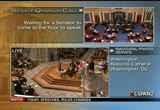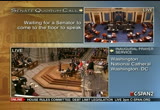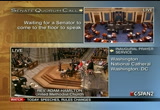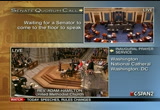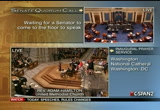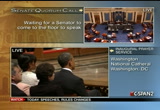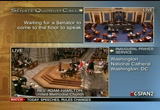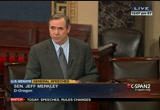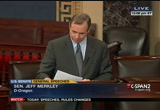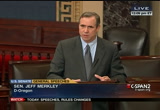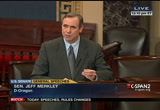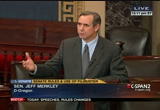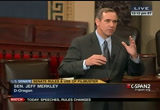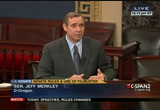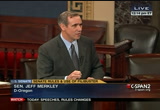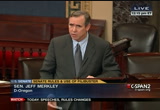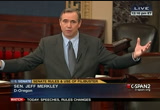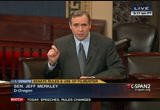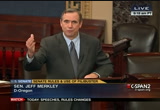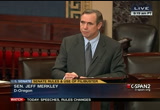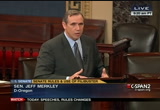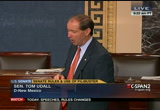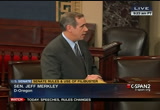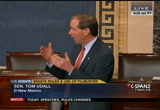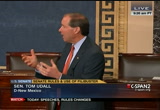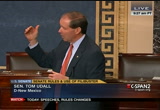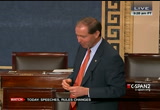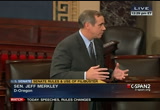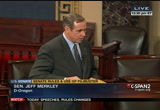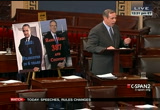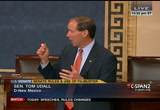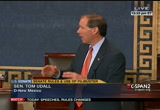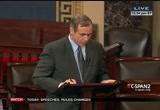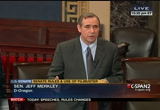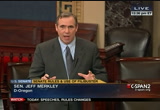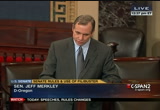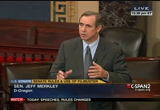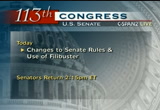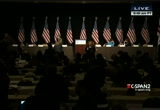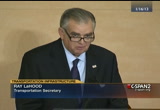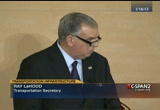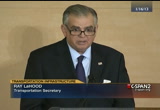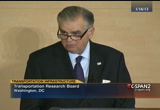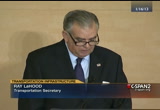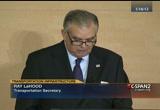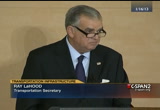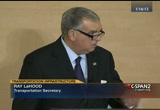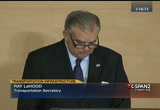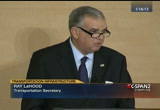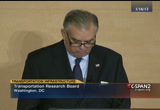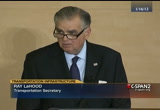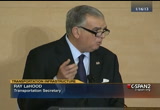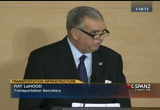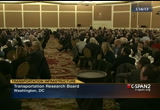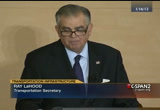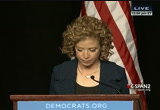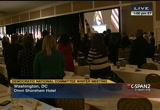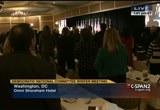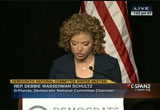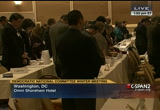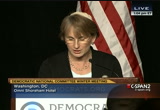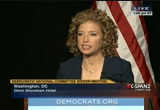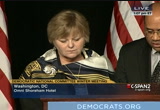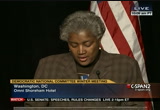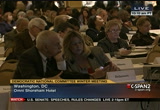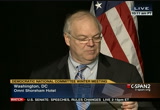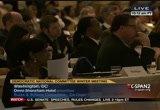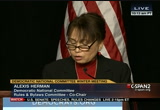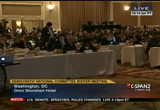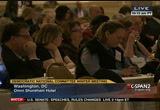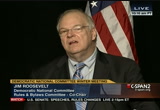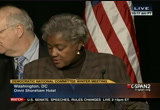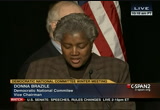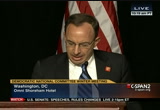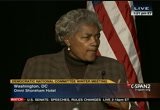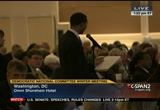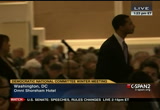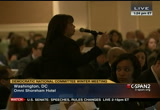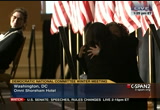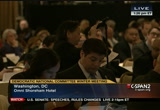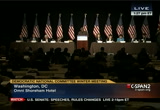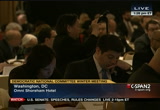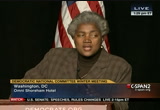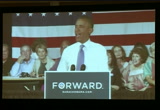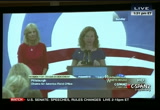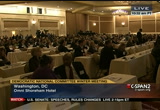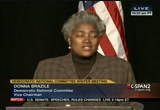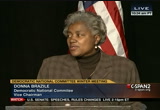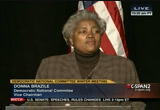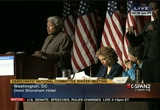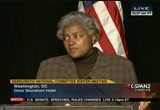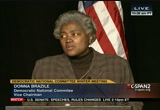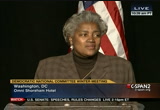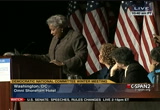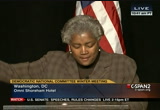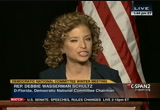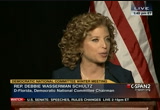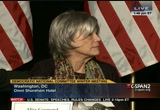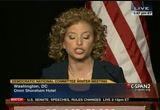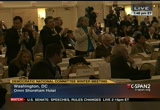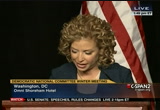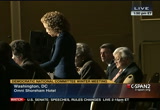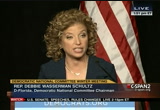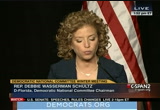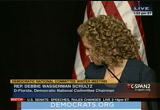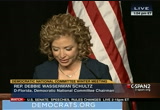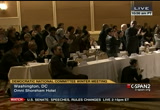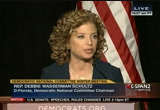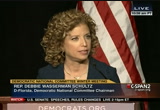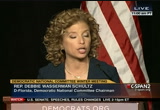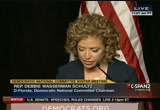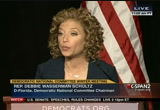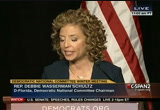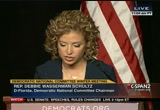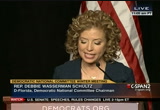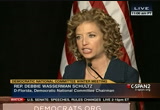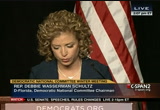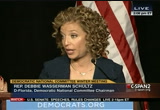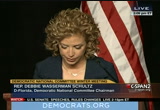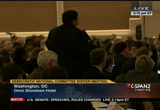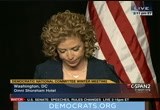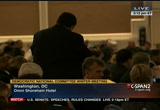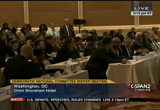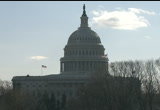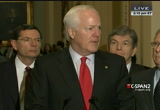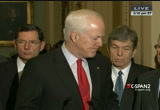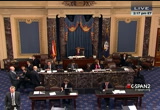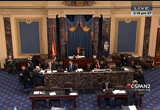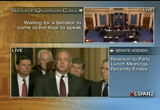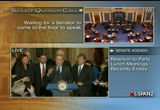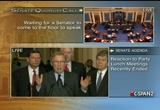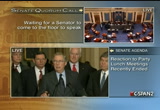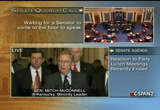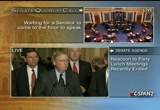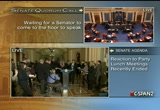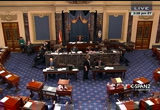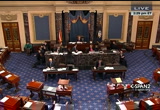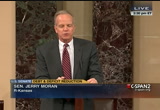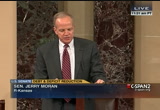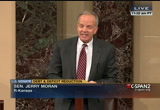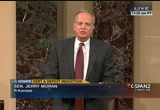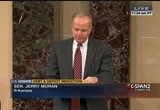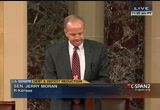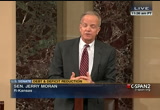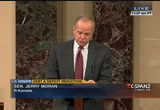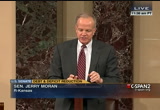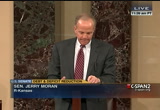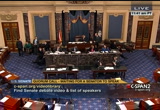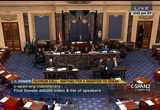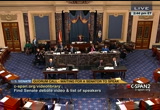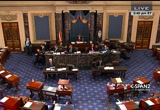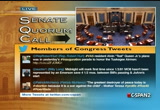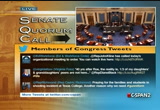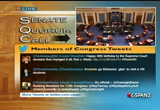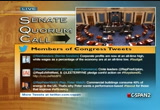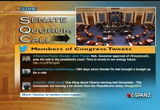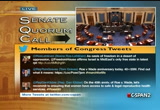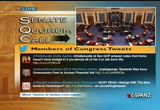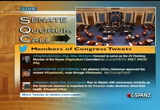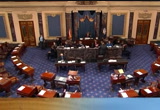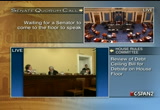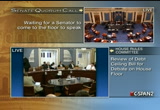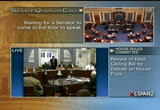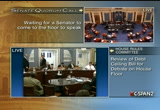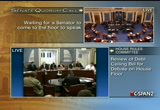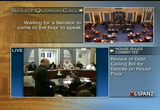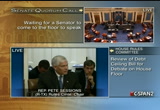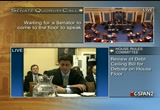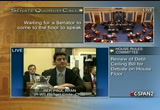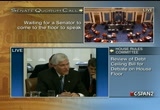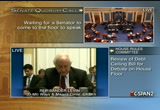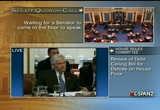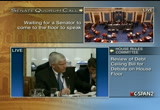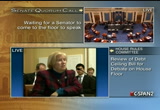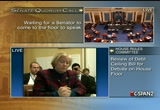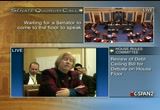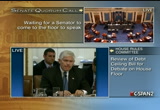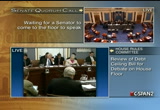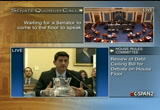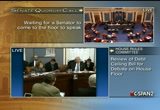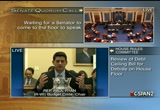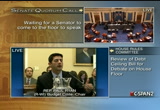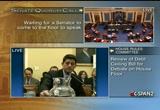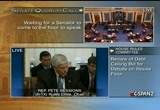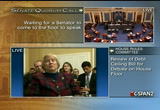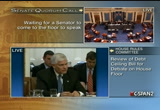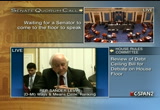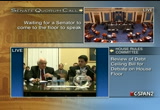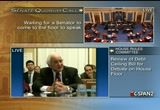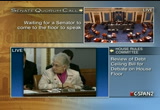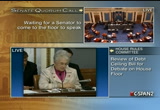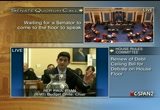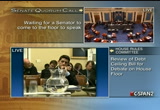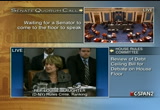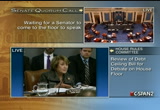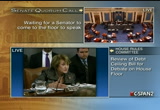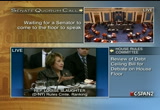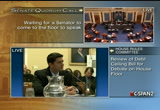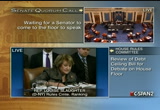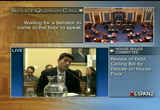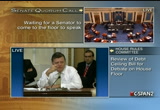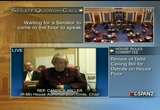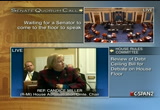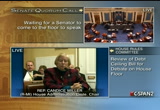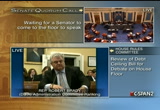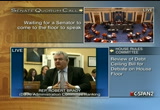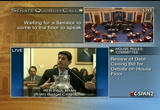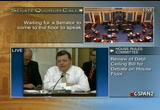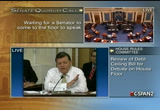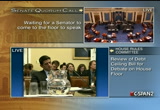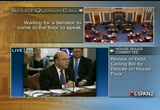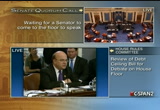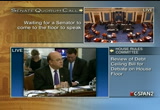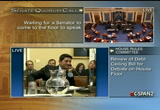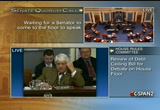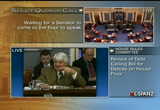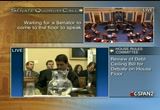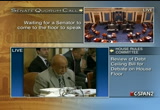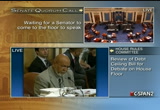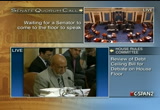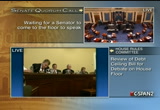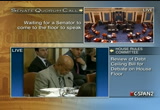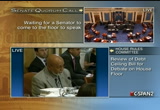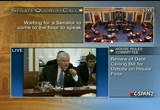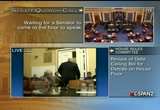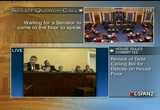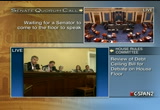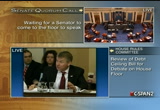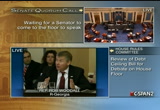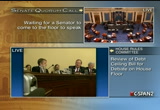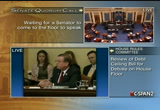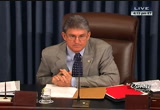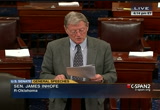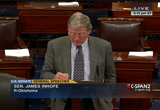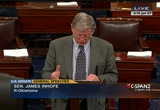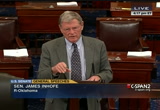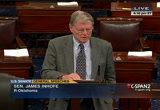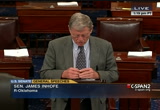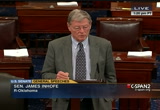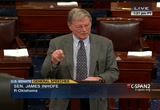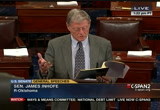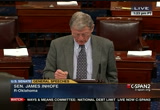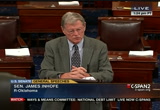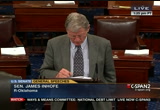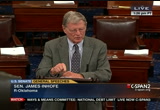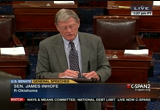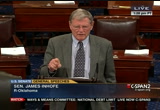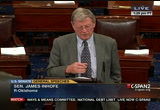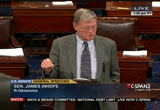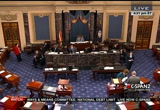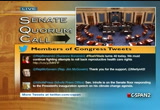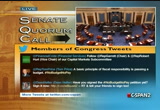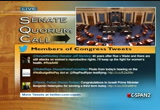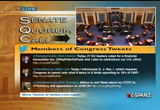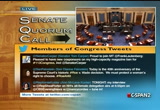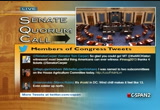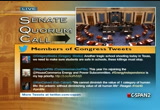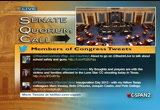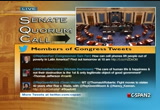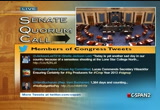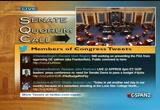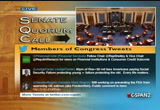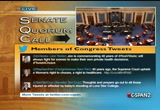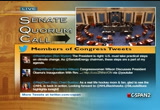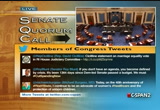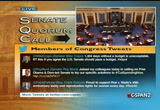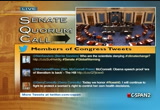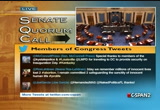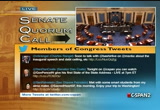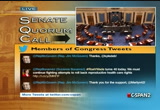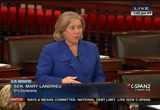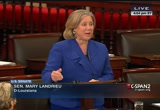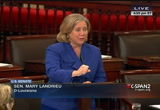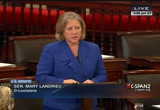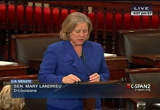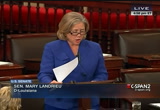tv U.S. Senate CSPAN January 22, 2013 12:00pm-5:00pm EST
12:06 pm
12:07 pm
i'm rising today to talk about the vision we have ahead for the next two years and how this united states senate can fulfill its responsibilities under the constitution to do its legislative responsibilities, addressing the big issues facing america. now, i don't think anyone is unaware that the last two years, this chamber has seen simply inaction and paralysis. it's been rated as one of the worst two-year sessions in the history of the united states government. well, what are we going to do differently? how is it that we only addressed one out of 24 appropriation bills over the last two years? how is it that so many important bills never made it to the floor of the senate, bills such as the replacement for no child left behind, coming on bipartisan vision out of -- out of committee? how is it that so many bills came to this floor to never see
12:08 pm
a final vote? the disclose act which would have eliminated secrecy in campaign donations. the dream act, which would have honored creating a future for those who know only america as their home. the president's jobs package, which would have helped put america back to work. the closing of loopholes for the biggest, most wealthy oil companies. those funds could be put to use, reducing our deficit or funding critical programs for working americans. on issue after issue after issue, we saw inaction. and what we heard yesterday at the start of this next two years was a call from the president for action. he said in his inaugural speech, "for now, decisions are upon us and we cannot afford delay. we cannot mistake absolutism for prince polar substitute spectacle for -- principle or
12:09 pm
substitute spectacle for politics or treat name-calling as increased debate." he continued, "we must act knowing that our work will be imperfect. we must act, knowing that today's victories will be only partial." the president echoed, if you will, the thought that he brought into his first four years, the urgency of now. that we have big issues facing america and it's time for the executive branch and the legislative branch to work together to address those issues. well, in this call for action, we must ask: how much action can there be if we see more than a hundred filibusters in the next two years? how much action can there be if on every request for a vote an objection is heard that creates a day of delay in this senate?
12:10 pm
the contrast is enormous from the time that lyndon b. johnson was president of the senate. lyndon b. johnson for six years presiding over this body saw one filibuster. and harry reid in his six years presiding over this senate has seen 391 filibusters. and let me convey that even when you have the votes to end a filibuster, the fact that it is launched creates enormous paralysis. imagine you're debating a bill and you continue debating through the end of the week and you come in the following monday and you debate and nobody has anything to say and so somebody says, "i ask unanimous consent that we have a final vote on this bill." now, you see, we don't have a previous question, motion on this floor, so one has to ask for unanimous consent. any of a hundred senators can weigh in and say "no." and when they they weigh in and say "no" on that monday, on
12:11 pm
tuesday, a petition is put forward with 16 senators saying, let's have a vote on closing debate. and that vote can't happen until thursday, under the rules. and if it's successful on a thursday, you have to have 30 hours more of debate before you can hold the final vote. that takes you into saturday. so monday through saturday is lost based on an objection on monday by one senator. if you have 391 of these objections that waste a week of our time in the course of a six-year period, then you basically waste every legislative week because there are not 391 weeks in a six-year period. well, it becomes pretty simple to see why we only got one appropriation bill done in the last two years, why so many bills never made it to the senate floor for consideration, even though they were essential to restoring the economic vitality of our nation and putting people back to work. and i, for one, find this absolutely unacceptable. there have been over our history
12:12 pm
three basic forms of filibuste filibusters. now, the first only worked in an age when transportation didn't work very well and at any given moment, there were a number of members that couldn't get here to the floor of this senate because they were traveling from their farm and their axle on their wagon broke or the train broke down or so on and so for forth. sometimes those journeys would take many weeks and things happened along the way. in that situation, a quorum of 50% plus one was sometimes in doubt. and those seeking delay could say, you know what, let's deny a quorum. well, that was an effective tool only through that early period. and then as that changed, folks said, you know, we have the respect here of hearing everyone out and, therefore, if i can get the floor of the senate, i can delay this senate as long as i'm able to speak. well, it's through this effort
12:13 pm
that we have a number of famous filibusters. folks like strom thurmond holding forth for 24 hours. we have, however, seen that a person can only delay the senate for 24 hours, then someone else can seek the floor and you can proceed. so that was a fairly modest strategy. now, in both the case of the denying quorum and in the case of speaking as long as you cou could, you had to spend time and energy, you had to organize and it was visible before this body. it was visible before the reporters gathered in the balcony. therefore, the american people, long before there was a television camera here, could see what you were doing and the public could provide feedback on that. but now we come to the modern era. from 1970 forward. in which it became popular to start using the objection as an
12:14 pm
instrument of party warfare, the objection to a final vote. you know, if we turn back before 1970, you had an overlap of the parties of perhaps 30 members. and so if one had used his objection, they'd have a good sense that you would be able to get cloture. furthermore, there was a social contract that you only interrupted the workings of this body on an issue of deep principle. you only blockaded the operations of the senate on an issue of profound concern to your state. not as a routine instrument of party politics. but that's changed over the last 45 years, since 1970 forward, the last 43 years, in which the minority party said let's show the majority can't even get an agenda on to the floor of the senate and then let's complain about them not acting. you know, this is not a philosophy that serves. it's not a philosophy that was embraced through the extend of our history.
12:15 pm
you came here with the responsibility to contribute in committee, contribute on the floor, try to make bills better, try to get issues addressed. not try to paralyze this body so issues don't get addressed so you can campaign on that side. that, quite frankly, is an unacceptable theme that has started to haunt this hall and we need to do something about it. indeed if you look at the modern era where the parties have become so divided you no longer see that overlap of 30 senators. and therefore any minority group be it the democrats, be it the republicans has the ability to bring this chamber to a halt. but is it right to do so? and if we cannot persuade our colleagues it is wrong to do so, then we need to change the rules of the u.s. senate. we need to say that if you are going to take and throw a shoe into the gears, if you are going to block aid the aability
12:16 pm
of the senate to deliberate and decide, you need to take responsibility on the floor of the senate. yes, we should get rid of the filibuster on the motion to proceed. filibustering on whether to get to a bill does not enhance deliberation on the bill itself. weeshedz make that decision in a crisp fashion and get and not waste weeks trying to decide if we're going to do the work of the people. second, we should get rid of the filibuster on going to conference committee. both chambers have decided. they have voted in favor of the bill. it's been passed in different forms. nothing should impede getting to conference, and having a negotiation. indeed, out of those negotiations even if you're starting with one one chamber with one dramatic view different from the other, is a coming together that may take steps forward that both chambers can grate. -- agree to. nothing should impede that negotiation from going forward. recognize, a bill can be filibustered when it comes back
12:17 pm
from pee committee, why would you impede getting to conference committee in the first place? we should greatly reduce the number of hours after we have gotten cloture on debate, on nomination by the time folks vote on closing debate, they know how -- our members know how you're going to vote on that nominee. so have final two hours but not a final 30 hours. 30 hours is another wasted set of days that we can ill afford to waste. and certainly it does make sense to say whenever possible we should cut down that 30 hours on bills after we've reached cloture. we can do it by i ask unanimous consent and often do it now. we do it by requiringvokes folks to proceed to a vote if they don't stand and talk but that's postcloture. but here's the thing: when 41 senators say they want additional debate, they want to delay the decision making
12:18 pm
process here in the senate, they should be willing to stand and make their case before their colleagues, and before the american people. now it takes time and energy if you go that direction. it doesn't become a freebie that one senator spending no time, no energy can go out to dinner, go off on vacation, can paralyze the senate. now you have to spend the time and, to make your case and not only is that important in stripping away frivolous filibusters, but it means the american people get to weigh in. i'm absolutely convinced if we were going back to the debate on the disclose act which stripped away scres in campaign donations and we had 59 votes to close gate, needed a 60th, those for additional debate fled this chamber fearful of making their case before the american people. if they had this had to stand and defend foreign donations in our campaign system, the american people would have said
12:19 pm
not that you're a here but you're a bum. they would have weighed in and said to their own senators join the effort to close debate because to stand in the way of a final vote over secrecy in campaign donations does great damage to our democracy, and maybe the pressure and common sense of the citizens would have helped address the bitter partisanship that divides this boat body. at a minimum, the citizens of this nation have the right to know what is happening to legislation here on the floor. the idea that is being paralyze bead this secret filibuster is unacceptable. so we should include the talking filibuster in any package that we bring to modify the rules of the senate. i see my colleague from new mexico has come to the floor, and he spoke earlier. he has taken and put forward the
12:20 pm
vision that we must at the start of every two years evaluate how if senate is working and if it has problems, we need to pass changes in the rules to address those issues. and this is not some remolt concept of inside baseball, this is about american citizens having a legislature that can address the big issues facing our nation. so i praise him for his leadership in putting this forward that has led to this day, the second time. we were here two years ago taking making this case, making this argument that we owe it to our citizens to improve the workings of the senate and we're here again today. there is a saying about the u.s. senate that the senate is the world's greatest deliberative body. if only it were so.
12:21 pm
it has been at various points in its history a thoughtful chamber, a deliberative chamber, but not today. driven by deep partisan differences and those being con verpted into strategies of fral pral sis that prevent deliberation. we must change that. it is our responsibility as senators to change that. the american people expect it. let's make it so. thank you, madam president. a senator: madam president? the presiding officer: the senator from new mexico. mr. udall: madam president, if i could ask unanimous consent to engage in a colloquy with my friend from -- the senator from oregon. the presiding officer: without objection. mr. udall: thank you, madam president. once again, let me just say at the beginning here, it's a real pleasure to see my old attorney
12:22 pm
general colleague, now the senator from north dakota, heidi heitkamp in the can be chair presiding over the senate and to see the senator from maine, angus king here. and the new senators, i think senator merkley would agree with this, the new senators bring an energy to this that we don't necessarily have. we were -- we're four years from our last campaign. we ran in 2008. and i just love hearing their stories and what they've heard and how they visited with people in town hall meetings and the american people get this. senator merkley, i don't think there is any doubt they really, really get this. i know you've done a number of town halls on this issue. i just hope as we have the chance to discuss this, both in our caucus and on the floor and with other senators that we can
12:23 pm
capture the energy of the senators who have arrived here and have been out with the people in their states, with their constituents and what they -- what they bring to this. senator merkley, i was going to ask you, i know you among many of the senators do regular town hall meetings. i've also done a number in my career. is this something that --this kind of rules change, is this arcane, is it people don't understand it or they're saying why are you bothering with procedure? or do people get it? do they get it in oregon when you're in a meeting? mr. merkley: to my colleague from new mexico, i would say they most adamantly get it. in fact, i had 13 town halls two weeks ago in conservative parts of the state, in more liberal parts of the state and in every setting, every setting from conservative to liberal,
12:24 pm
folks said please, please continue this effort to address the filibuster and the paralysis. and the simple notion behind the talking filibuster that if you as a senator are voting for more debate, that is, to delay the workings of the senate, you should be making your case on the floor so that they get to see what's going on and they get to decide whether they support it or oppose it. just resonates. it's the way folks think the senate worked, and they often think the rules changed and required it in the past and not now, and it's a chance i have to explain to them that really the social contract has changed, that when people objected to the senate proceeding with its business in the past they wanted to make their views known on the senate floor, they wanted to take responsibility because they realized it was a very high privilege to be able to delay the senate and that they had a responsibility to do so only for deep principle or large issues and to make their case known.
12:25 pm
so i see overwhelming support. i feel like the american people are so far ahead maybe of our own chamber in understanding how broken we are and how much it needs to be fixed. mr. udall: senator merkley, i also, you said -- you said to nice comments about me, you were probably a little too generous, but i'd also like to thank you for all the work that you have done on this issue. you have been a passionate voice for change, and you and i have both reached out to our friends across the aisle and tried to get things done. and one of the -- one of the things that i always bring this back to is why are we doing this? we're doing this so the government can tackle the issues that the american people really care about. and i think there are two times in history, i'm sure there are many others, where for me the senate was in its glory days,
12:26 pm
and we should always remember we have that potential. we see little -- little bits of light every now and then here with the passage of a transportation bill, or a farm bill out of the senate where bipartisanship when we come together. but the glory days of the senate, just to talk very briefly about two, one was before the civil war in the 40 years before the civil war, the senate was grappling with how do we hold the union together. and there was tremendous discussion, and senators like daniel webster and calhoun and others would work with each other and have heated debate, but for that 40 years before the civil war, they held the country together. and it was the senate that fashioned those compromises that allowed the country to stay out of a civil war.
12:27 pm
they didn't complete completely prevent it, but most people looking at history say those were some of the glory days of the senate. and the second period was in the 1960's and 1970's with senators like musky and -- musk ye and -- muskee and stafford and chafee, giants in this body who stepped forward and civil rights, stepped forward on environmental issues, stepped forward on the pressing issues of the time. and so the senate once again in that time period passed laws. i remember i was a kid here in washington, my father was secretary of the interior, the wilderness law, clean water act, clean air act, we set up the environmental protection agency. i mean, these were big laws, big, bold laws that were dealing with our problem. so once again, glory days of
12:28 pm
the senate. and i -- i -- i think we have that potential as i see the new senators coming in, the folks that were elected with us, the senators that have arrived in the last five or ten years. i think we have the ability to respond in a big, bold way to the crises that face us. and i know senator merkley, you came here a young man with senator hatfield i believe and you saw a different senate. maybe you could talk about that and we don't want to stay, i know we're going to a caucus and we have our generous chair here, so we don't want to keep her up there too long, our presiding officer. anyway, senator merkley, i yield. mr. merkley: i think my colleague from new mexico is absolutely right in pointing out there were periods when the senate really worked to address the big issues facing america. and it wawnltd that there weren't -- wasn't that there
12:29 pm
weren't profound differences. there were fierce differences, emotional differences, deep differences but folks came to this floor, they conversed, they laid out their arguments and ultimately they made decisions about which way to go. and they didn't bring the attitude let's just paralyze this chamber from doing doing nothing. had they done that, it would never have been the set of changes that addressed significant issues in either of those periods. and my colleague is right, part of the reason that i feel so strongly about restoring the functioning of this senate is when i came here as an intern at 19 for senator hatfield, i had the very good fortune to be assigned to the tax reform act of 1976. and then i had the even better fortune that it came up on the floor of the senate. so during the many days it was before this body i sat up in the staff gallery and watched as
12:30 pm
amendment after amendment was raised and debated on and voted on. there was no camera, no email, the member of the senate team that was responsible for it would run down from the staff gallery, intercept your senator, explain what the issue was, what had been said about it, what folks back home thought about it, what the set of motions had been done on it, and it was a legislature at work. and rarely, rarely did the thought that anything would not be decided by 51 pass the minds of the senators. that was something observed, that objection to 51 was reserved for very special occasions, very rare occasions you might do once or twice in your career. i do -- i do feel like the conversation we have before us is so important, and i thought i'd put up this chart. this just dramatizes -- and my
12:31 pm
colleague can see it -- but it's a picture of lyndon b. johnson, showing his one filibuster in six years, one time that he needed to get a cloture petition to try to shut down debate. otherwise, there was a courtesy and -- and people whasd the saiy had to say and then stood aside and took votes. and here we have harry reid in his six years, it says 287 and counting -- well, 391 before he completed his sixth year. so an enormous, enormous difference. and the work that we've engaged in right now, of trying to find a way to have every voice heard and then to be able to proceed to be accountable and transparent before the public is -- is so important. i would note that sometimes, as -- as you and i have engaged in this conversation, we've heard criticisms from across the aisle saying you're trying to silence the voice of the minority.
12:32 pm
do you see anything in the proposals that we've been advocating for that in any way silences the voice of the minority? mr. udall: in looking at this, i do not see anything in the proposals. and, i think we, in working this together, tried to -- to bring a discipline to it that said we want to preserve the best traditions of the senate, we want the minority to be heard, we want the minority to be able to have amendments. and we want them included in the process. what we don't want is the tyranny of the minority. and the founders talked about the tyranny of the minority. they talked about the fact tha that -- that if you allowed a small minority to govern and block the governing of the majority, that that was the tyranny of the minority. and they feared that. and so i think when we consider this and we talk about the
12:33 pm
filibuster and our institution today, our united states senate, where many times the republican leader has come to the floor and said, it's going to take 60 votes. everything takes 60 votes. well, that isn't the way the founders designed it. the founders had actually very strong language for what they thought of supermajorities. everybody remembers their history. the founders came off the articles of confederation. it was a supermajority. it didn't work. it was broken. and so they only put into the constitution in five places, supermajorities. things like expelling a member and ratifying a treaty. but, otherwise, simple majorities. and now how -- how this happened? it's hard -- when the history's going to be written, it's hard to tell. but to have a leader of the
12:34 pm
senate stand up and say, "everything takes 60 votes." well, the founders never contemplated that. when they adopted rule 22 in 1917, that wasn't what they were trying to do. and the rule has actually been turned upon its head. so with that, since i initiated the -- the colloquy, i'm going to yield the floor at this point and... mr. merkley: madam president? the presiding officer: the senator from oregon. mr. merkley: i'm glancing to see if any of my colleagues would like to say anything at this point. i just want to follow up on the last point that senator udall, my colleague from new mexico, made about our founders. i have in my hand three of the "federalist papers." ""federalist paper" number 22, number 75, number 58. and these are by madison and
12:35 pm
hamilton and they explore this issue of the supermajority. it was a very conscious decision that a supermajority was not put into the constitution for decisions of cheese chambers. and the reason why -- they explain it more eloquently -- but is essentially that if you take the path that the minority thinks is the right path rather than the path the majority thinks is the right path, then over time you make a series of worse decisions. the minority might be right on occasion because most of the time the viewpoint represented by the greatest number of states in this case or the greatest number of citizens on the house side, is the path that makes sense. and they warned about the supermajority as an instrument that would bring paralysis. it's almost like they could look forward 200 years to this moment and say, don't do that because you'll end up with paralysis. this is from "the federalist paper" number 22 by alexander hamilton. he wrote this in 1787.
12:36 pm
and he notes, in commenting about the -- the issue of simple majority or supermajority, says, "there is commonly a necessity for action. the public business must, in some way or other, go forward. if a pertinacious minority can control the opinion of the majority, the majority, in order that something must be done, must conform to the views of the minority. and thus the sense of the smaller number will overrule that of greater and give a tone to the national proceedings. hence, tedious delays, continual negotiation and intrigue, comtemptible compromises of the public good." let me read that last set of words about what hamilton said would happen if you had a supermajority requirement in the u.s. senate. tedious delays, continual negotiation and intrigue, comtemptible compromises of the public good. i think anyone watching the
12:37 pm
proceedings of the senate over the last two years would say that hamilton was right on the mark in that regard. and, of course, he was not alone. there was not a single "federalist paper" written arguing that there should be a supermajority in the senate or the house because of the experience that had been had previous to forming the strategy embodied in the constitution. so let's turn to james madison. james madison said, "it has been said that" -- and this was federalist 58 -- "it has been said that more than a majority ought to have been required for a quorum." and he goes on to discuss it in various views. and he says, lastly, "it would fafacilitate and foster the painful practice of practices which has shown itself only be in states where a majority, a practice subversive of all the order and principles of regular government, a practice which
12:38 pm
leads more directly to public convulsions and the ruin of popular governments than any other which has yet been displayed among us." and he also made point that you would end up with equitable sacrifices to the general wheel or general good. so as we turn to our conversations in our respective caucuses and to the dialogue here on the floor of the senate, i ask my colleagues to search your hearts about our responsibility to the citizens of the united states of america to address the big issues facing america, which means that we don't paralyze this body in secret. if you have points to make then do them, as was done during periods of great debates on the floor of the senate, make them on the floor of the senate, engage in that debate. and when no more is to be said, when all hundred senators say, we have had our full input, then
12:39 pm
let's make a decision. madam president, i yield the floor and ask that we recess? the presiding officer: under the previous order, the senate stands in recess until 2:15 p.m. also possible this week in the senate, work on the hurricane sandy relief efforts. we'll have live coverage of the senate when they return at 2:15 eastern here on c-span2. going to take you live next acrosstown in washington to the democratic national committee and their winter meeting about to get underway. they're going to hear from democratic national committee chairman, debbie
12:40 pm
debbie wasserman schultz. it should get underway shortly here on c-span2. democratic national committee chairman debbie wasserman schultz will speak shortly talking about the democratic party's agenda and challenges ahead for the 113th congress. we'll have live coverage when she gets underway on c-span2. a look at the agenda ahead in transportics with secretary ray a are hood who called on congress to pass a five-year long-term transportation bill.
12:41 pm
[applause] >> hello, everybody. thank you very much. good noontime to all of you and thank you for including me again in your program. i want to ask all of our dot team gathered for lunch to stand up and be recognized. all dot stand up and be recognized. [applause] thank you all. thank you. i know that trb wouldn't be what it is without the good reap sources of a lot of our people who contribute so much to the program. i also want to say a special word of thanks to john horsley, tony keane and jack
12:42 pm
basso for extraordinary service over many, many years to improving transportation, to improving all that has gone on in transportation for a long period of time. will you help me thank them for their great, great work that they have done? [applause] for a long time. and i want to thank trb for encouraging young people. all the young people that are here. the future is very bright. the future is bright in transportation. there will be many opportunities, and i know that you enjoyed your lunch and i hope that just rubbing elbows and talking to people in transportation will encourage you for the opportunities that lie ahead for you. and they would not really be available without great leadership on trb's behalf
12:43 pm
for you, but thank you all for being here but more importantly to trb thank you for encouraging young people. when president obama first asked me to do this job we had a lot of work ahead of us. we were facing the greatest economic crisis in over a generation and our infrastructure was in desperate need of repair but president obama had a vision. a vision of an america built to last. over the last four years we have made unprecedented investments in our nation's transportation system. i have personally visited over 200 cities in america. meeting with local leaders and delivering on what they have told us they needed. we've put people to work on our roads, on our bridges, on our rails in communities big and small. i have visited every state
12:44 pm
and 15 countries. and i think as a result of the work that we've done that our team has done, with many of you in this room as partners, we have made it easier to ride a bike, hop on a train, or catch a bus. in fact i'm thrilled to tell you about our new streamlined approach for the new starts competitive grant program. in 2010 we made a commitment and a promise to change the way we rated and evaluated capital transit projects so that more good ideas could get into the federal funding pipeline. i want to especially thank peter rogoff and his team at the federal transit administration for making this happen, for con continuing to push it. i'm proud to say we deliver on our promise. our new streamlined approach will insure that local officials who know best what
12:45 pm
their communities need can invest in infrastructure that we need now. and i've said many times before, safety is our number one priority. many of you have heard me say, thousands of people today boarded planes, buses, trains, automobiles without thinking about whether the plane was safe or the pilot was well-trained or the train driver or the bus driver was properly licensed or the bus company was properly licensed. that is what we think about at dot. every day, all of us, worry about safety. so the american people don't have to worry about it. in 2011 the nation saw the lowest number and rate of death on our nation's highways due to safer vehicles, improved awareness of safety and strong enforcement. over the last four years we worked with our partners to
12:46 pm
encourage people to buckle up, to get drunk drivers off the road, and to end our distracted driving epdemic. in fact, we launched a national campaign to stop drivers from using handheld cell phones and texting behind the wheel. four years ago very few people knew what distracted driving was. and thanks to a lot of energy and time and people working together we have come a long way. we still have much to do. to date 39 states ban texting while driving. 10 states ban handheld cell phone use. in the skies we are enhancing safety and cutting delays by moving towards nextgen which maximizes the benefit of gps-based surveillance and navigation. we improved outdated pilot
12:47 pm
flight and duty rules to give commercial passenger pilots the rest they need to operate. in addition to our safety efforts, we are fulfilling president obama's bold vision for american rail, laying the foundation for high-speed rail corridors in 34 states and the district of columbia. in california the nation's first true high-speed rail will break ground this year. four years ago very few people were talking about high speed passenger rail in america. when the president put $8 billion into the economic recovery plan, that was 8 billion times more than our country had ever invested in high speed passenger rail. today it is up to 12 billion. the countries that i went to and visited in the first two years of my time in this job there was a common denominator, a common theme
12:48 pm
in every country. the national government made invests in passenger rail. and finally with president obama's vision we have a leader whose made the commitment to get our country into high speed passenger rail and it's a strong commitment and it will continue. our goal and our dream is to connect 80% of the country over the next 25 years. our best partners have been the states. our best partners have been governors. our best partners have been secretaries of transportation. our best partners have been people with a vision. high-speed rail is about the next generation of transportation for the next generation. every generation that's ever worked in transportation has left something important for the next generation. previous generations have left america the interstate
12:49 pm
system, the best in the world. what we will leave to the next generation is high-speed passenger rail, not for ray lahood but hopefully for my 10 grandchildren. that's our dream. and you all have been helpful in realizing that dream. it would not have happened without a vision from president obama and the investments that we have made. we're very proud of this. we want to continue it. in the northeast corridor we have invested more than $3 billion for long-term overdue upgrade and replacement of vital infrastructure and new equipment. over the last four years wee helped community invest anyone know straight tiff projects that make a real difference in people's lives. under the popular tiger grant program, we invested $3.1 billion to fund 218 projects in all 50 states and you all know people come
12:50 pm
directly to us for tiger. they don't have to go to their governor with all due respect to you secretaries of transportation. it is nice when american come and talk directly to the secretary of transportation with an innovative, creative idea. and through tiger we helped ports, more than any other administration. we helped start streetcar projects more than any other administration. and light rail programs. and walking and biking paths and really helped communities with liveable, sustainable community goals. that's what tiger has done and congress has seen the wisdom of this. and we believe that tiger will continue for a long time because of the opportunities it provides to do innovative, creative opportunities in communities. we're proud of the streetcar project in new orleans, a new intermodal hub in denver and a complete revitallization of downtown
12:51 pm
dubuque, iowa. and now with the signing of a new transportation bill, map 21, our tifia loan program is another great resource. almost over $2 billion over the next two years. tifia, which is transportation infrastructure innovation and finance act provides loans and guaranties for standby credit for major infrastructure projects throughout the nation. how many bridges are there that need to be rebuilt or built? how many pieces of major infrastructure need to be built or rebuilt? and for a lack of resources they go wonting. now we believe that tifia offers the opportunity for american cities and our states to again come directly to d.o.t. with creative and innovative ideas. the tifia program made
12:52 pm
possible 31 projects and turned $10.5 billion in d.o.t. support into over $42 billion, the leverage, that is allowed under tifia is extraordinary. we know there's a lot of money out there and through the use of the tifia loan program you will see some big projects get funded. the bottom line tifia helps our transportation dollars go further. map 21, which was signed into law by president obama last summer, transforms tifia into the largest transportation infrastructure loan program in history making up to $17 billion in credit assistance available for critical infrastructure projects. map 21 does a lot of other great things for transportation. it includes $81 billion for highways and $21 billion for transit capital investments.
12:53 pm
provides states and communities with it years of steady funding to build roads, to build bridges, and to build transit systems. and it will insure the solvency of the highway trust fund through fiscal year 2014. map 21 allows to continue to improve the way we make, the way we move freight that fuels our economy. map 21 streamlines and consolidates programs. map 21 helps short project delivery a priority for president obama and congress. when we deliver projects faster we deliver their benefits faster. like enhancing safety, less congestion, and a cleaner environment. the project delivery improvement included in map 21 are based on an innovate shun initiative known as every day counts. they took it from you, victor. you've done a great job with everyday counts. let's hear it for victor
12:54 pm
menendez what he has done and his team has done. thank you, victor. [applause] the concept behind everyday counts is the same as this year's trb conference. better, faster, and smarter. finally map 21 helps us keep our transportation system safe. this law gives the department for the first time oversight over transit safety. again, beg thanks goes to peter rogoff of a the train crash here in washington, peter and i sided we would commit ourselves to getting the department of transportation into the transit safety business of and thanks to all of his decades of experience on capitol hill, he and i worked with congress to have included in map 21 the ability of the fta to have responsibility for transit safety. we were outlawed from doing
12:55 pm
it and now we will have the authority to do it. this is a real breakthrough and it really fits our safety agenda. it is long overdue and will insure that buses, subways, street cars, light rail systems, everyday, are the safest in the world. map 21 provides $2.6 billion for federal safety efforts. the bottom line is, we've made a lot of progress guess. we've done it in cooperation with congress and we worked with congress to make these things happen. at d.o.t. we will continue to support solid research and innovation. the only credibility that we have at the department is when people look to us, to give guidance on safety or other programs. they know it's based on good data and good research. and we've appreciated the relationship with our friend
12:56 pm
at trb. we only have credibility because of the basis from which it comes. good research and good data. we will continue to use federal invests to create more transportation options for hard-working americans. our future depend on our ability to dream big and build big. president lincoln once said you can not escape the responsibility of tomorrow by evading it today. well, we are looking at tomorrow and we see what needs to be done. let me just conclude with this. the next big challenge for transportation will be to help congress put together the next transportation bill. now, the only reason this map 21 bill is a two-year bill because that is all the money that congress could find. we need more than a two-year bill. we need certainty we need to be able to give the states
12:57 pm
and transportation officials all over this country certainty. a five or six-year bill gives that certainty. the big debate over the next two years as congress puts together a transportation bill and many of you will be involved in this, is not what america needs. we all know what america needs. if i asked every table here to put together a list of what america needs the list would all be the same. they would be. they wouldn't be dissimilar. the debate in washington and in america when it comes to infrastructure is how do we pay for it? how do we pay for a five or six-year bill? how do we have the resources that we've always had in america to build a state of the art interstate system, to build the bridges that we've built, to build the big things that we built? where do we come up with the resources? that's what the debate will be about and you need to be a part of it. and we need to make sure
12:58 pm
that we don't become a second class country when it comes to infrastructure. we have always been number one but we are falling behind. you know what is going on in china and asia, and other places in the world. they're outcompeting us on infrastructure. because they're willing to put the resources in it. that's where we need to get back to. so you need to be a part of the debate. how will we continue to be number one in infrastructure? in building our communities, in doing what all of you know needs to be done. and all of the things that we want to do. we need the resources. let's don't become second class citizens. i hope you will become a part of the debate. if you do, america will be number one again. which is where we need to be. thank you for all you do and thank you for being great partners with d.o.t.. [applause]
12:59 pm
>> we are live in washington this afternoon for the democratic national committee's winter meeting. we'll hear first from the national chair debbie wasserman schultz as dnc leadership this afternoon lays out the agenda for the committee. this was supposed to get underway at 11:45. as you can see they are running a little bit behind. we'll have live coverage when it starts here on c-span2. >> good morning. if i could ask everybody to take their seats. . .
1:01 pm
1:02 pm
>> let's give springer high school another round of applause. thank you so much. [applause] amy is senior rabbi at the largest jewish congregation in virginia. this gives her the distinction as being one of the largest congregations headed by a woman rabbi. she's involved in many jewish organizations and served on the board of central conference of american rabbis and co-coordinator to reform judaism and worked with reform organizations like the religious coalition for reproductive choice, housing organizations, and active in community aids projects. rabbi schwartzman will deliver the invocation. rabbi?
1:03 pm
>> god our creator, we seek your blessing today as we gather to initiate a new chapter in the history of our nation. we seek your blessing as our leaders dedicate themselves anew to the task of healing and repairing your world. we turn to you, oh source of life, and ask for guidance as the members of this democratic party work for the welfare of the people of this nation. instill in them a deep awareness of the tasks at hand and a heart felt appreciation for the lives that are impacted by their every action and decision. encourage them to stretch out their arms and open their hands to embrace new partnerships, new friendships, and new visions. we gather today full of hope. yesterday, from the steps of our
1:04 pm
capitol, voices of optimism, courage, faith, dedication, tolerance, sensitivity, and love filled the ears and hearts of americans all over the nation. we were reminded of the compelling values of the founders of this great country and inspired to pursue those values in our own towns, schools, offices, and in our homes. may all of us eagerly answer this worthy call. we gather today full of hope as we ask god's blessing on our president, barack obama, and all of those people who join him in his efforts to make real your vision, oh, god, the vision of a world of justice, righteousness, and peace. today, we ask god's blessing, too, on the leader of this auspicious group, debbie
1:05 pm
wasserman-schultz. lord, we call you be many different names, and you speak to us in many different ways. look with favor upon all of us on this day. bless as us one. we pray assed plsmist did. may the work of -- add our psalmist did. thank you so much. [applause] >> thank you. now i'd like to recognize the secretary for the termination of the quorum. [cheers and applause]
1:06 pm
>> thank you. [applause] thank you. just calling the quorum, guys. thank you so much. [laughter] i am so very pleased to announce after yesterday's glorious inauguration and perhaps a late night of celebration that 317 democratic national committee members have registered in person for this meeting and we have 47 process for a total of 364 out of 460 members who, yes, madam chair, our national democratic committee is here eager to support our friends and take back the house. elect democrats at every level of government, and fight for our values for 100% of the american
1:07 pm
people. thank you, thank you, madam chair. [applause] >> thank you, secretary. the next item on the committee's agenda is the report from the credentials committee. i want to recognize co-chair susan and everett ward to give us an update on the committee's actions. >> thank you, madam chair. on behalf of everett and the credentials committee, we're honored to present the report. >> the credentials committee had a challenge to the election of the dnc members from the state of georgia and a challenge to the election process used in the election of dnc members from virginia. >> most of these challenges were
1:08 pm
received in a timely fashion and reviewed by the credentials committee co-chair. after reviewing each of these challenges, the co-chairs determined that neither of the challenges had merit and the members under challenge were determined to be properly elected members of the democratic national committee. >> with that, we now recommend to this body the adoption of the credentials committee report as presented. thank you, madam chair. >> thank you very much. >> thank you very much to both of the co-chairs. entertain a motion to approve the report of the credentials committee. is there a second? is there any discussion? seeing none, no further discussion, in favor of approving the report of the credentials committee say, aye. a posed nay. the ayes have it and the committee report is adopted.
1:09 pm
at this time -- thank you very much for your service of the at this time, i'll take my seat and ask the amazing vice chair to chair this portion of the meeting. >> yes, ma'am, thank you. [applause] thank you. good morning or good afternoon. some of us had a late night shaking a tail feather. [laughter] oh. let me see. thank you, debbie. well, it's almost time for us to elect the slate of offices, but before we do that, we must adopt some rules to guide this process. you should have received copies of the rules of procedures for the election of dnc offices. these rules detail the different procedures -- you didn't get it? >> no. >> we sent it electronically, right behind those inaugural
1:10 pm
tickets, those ball tickets. when you were shopping for your gown, we sent them out. staff assured. okay? okay? let me -- let me emphasize that we have copies of the rules of procedure. i know we had rules and by laws committee sub meeting back in december to assure everything was appropriate, and then we sent it out at that time. these rules detail the different procedures including previsions on process, and, of course, motion. i would now like to recognize my esteemed -- or thee esteemed, my colleagues on the rules and bylaws committee, and the honorable elect to determine --
1:11 pm
to walk us through, of course, the process and the rules as they were sent to you that will guide us through this process. madam herman? okay. mr. honorable roosevelt, are you here? good because i can't read beyond that. forgot my glasses. second time i've been interim chair so i'm going to take advantage of it. [laughter] >> thank you very much, madam vice chair. thank you, madam chair. my co-chair, secretary elect and i are here to recommend the adoption of the rules of procedure. even though today's elections for dnc officers are uncontested, we have to conduct the elections in accordance with
1:12 pm
the rules. last month, the rules and bylaws committee drafted the proposed rules and voted by mail ballot to recommend the rules for adoption by this full meeting. the proposed rules were sent to dnc members by e-mail on december 2 # 1, 2012 by the secretary, and there's copies here available for you today. the rules recommended by the rbc for adoption by this full dnc are essentially the same rules that the dnc used for the elections since chairman brown's election in february 1989 with minor modifications to allow for the unique circumstances faced at the meeting. i'll turn to secretary herman for an expolice station of the rule -- explanation of the rules of procedure. >> good morning. thank you very, very much, jim. jim has outlined the process of
1:13 pm
how we will begin. i will start with reminding this body of the specific provisions that are contained in our charter and bylaws that guide the election of offices for the party. after that, my co-chair will come back to the podium and then review with this body what we are specifically recommending to govern these elections today. first, i shall remind this body that the rules of procedures contain the following key provisions. first, that candidates for any dnc office position had to file a nomination statement with the dnc secretary by 8 p.m. sunday, january the 20th, 2012, and that included -- sorry, 2013. that really would have been a problem. >> yeah. [laughter] >> that included signatures of at least 20dnc members.
1:14 pm
each candidate for chair is entitled to a total of ten minutes for nominating and seconding speeches to be divided among no more than four speakers, all of whom must be dnc members. each candidate for the other officer position shall be entitled to a total of five minutes for nominating and seconding speeches which may be divided among no more than three speakers. a majority of the full membership of the dnc present in person which for this meeting even means they are in this room or by approximatey of and institute a quorum provided that 40% of the membership is present. no dnc member may hold more than one proxy. all proxies must be in writing and signed and must be submitted to the dnc's secretary prior to
1:15 pm
the commencement of a vote. no proxies or transfer of proxies will be accepted by the party secretary while a vote is being conducted. the dnc officers shall be elected by a majority vote of the dnc members, present or by proxy, and the chair shall be the first office that is elected. in voting to elect the chair, voting may be conducted by a visual standing vote or by other means of division. if the chair is in doubt as to the results of the division, the voting will be conducted then by a roll called by our secretary. now, those are the standing provisions of what we must do for the election of our officers. my cochair recommends procedures
1:16 pm
to govern this election process. >> following the election of the chair, the rules provide for the election of the other party officers. elections will be conducted for vice chair for voter registration and participation the the three other vice chairs, treasurers, secretary, and national finance chair. the rules and bylaws committee recommends to this body the adoption of the rules of procedures as distributed. we also recommend that the rules be suspended because as you are aware, the slate does not currently conform to the charter. the rulings be suspended, and this is a procedure utilized in the past, that the rules be
1:17 pm
suspended except with respect to the chair so that a charter amendment and a ratification vote of the slate voted on today can be adopted at the next full meeting of the democratic national committee. that is the report of the rules committee. >> all right. thank you, jim, and all members of the committee of the rules and bylaws committee, ensure the election of our officers is done through a fair and open process. the chair would entertain a motion to adopt the rules to procedure as printed. now, i hear a second? is there a second? is there any discussion?
1:18 pm
yes, sir? >> hello, mad p.m. chair, steven from california. does that include mr. roosevelts suspension of the rules for guarding the positionings other than the chair. >> no, i believe this is only a discussion of the rules, yes? yes. >> thank you very much, ma'am. [laughter] i need to be interim chair a lot longer to get comfortable. [laughter] all right. okay. seeing none, all those in favor, please, signify by saying "aye," all those oppose? the ayes have it and l rules and procedures have been adopted. in cooer dance to the rules and procedures adopted, it's important to move to the election of offices. we'll move to the election of the dnc chair. secretary jamon informed me
1:19 pm
nominated petitions were filed purr sente to the rules of procedure for one candidate. congresswoman wasserman-schulz is entitled to ten minutes for nominating speeches. that's good. [laughter] the chair will now recognize dnc treasurer for the purpose of nominating the congresswoman for chair. andy, you may come up here and be comfortable. [laughter] >> thank you, madam interim chair. fellow dnc members. i stand before you today still high with pride and hope from yesterday's inauguration, and like you, inspire the to continue the work to which we are all committed. towards that end, i have the honor to place into nomination for chair of our party a woman who is a democrat from head to
1:20 pm
toe. [cheers and applause] you see what's coming. the head part, you all know, whether first hand from her quick mind or tough, effective talking head on the sunday shows, or by virtue of the votes we cast here four years ago, head of the oldest, continuous party on the planet. the tope art you may not know, but i'm pleased to reveal to you now. the woman whom i nominate today wears a size seven running shoes and on the left back heal of which is the word "vote," and on the right back heal of which is the word "democrat," seriously, she really does. [applause] she runs. we follow. one foot after the other in my adopted state of florida and around the country, vote democrat. she has been doing if for four years inspiring people from
1:21 pm
maine to michigan to montana. vote democrat, and it is my privilege to place into nomination for chair of the democratic party, my friend and florida congresswoman, a democrat from head to toe, congresswoman wasserman-schulz. [cheers and applause] >> thank you. the chair now -- the interim chair now recognizes colorado national committee man, anthony grays for the purpose of seconding this nomination. [applause] >> thank you, madam interim chair, and thank you to the colorado delegation for that warm reception. [laughter] it is a great honor to recommend the nomination of our incomparable chair, congresswoman wasserman-schulz.
1:22 pm
i admiredded her from afar, but over the last two years, it's a real treat to see her up close and personal on several visits to our great state. helping remind colorado why they put their trust in president barack obama for four years and why it was important to trust him once again. every single day of the campaign, she was a fierce advocate for president obama and democrats from all walks of life. whether it was tangling with republicans on tv, traveling to every corner of the country on behalf of our candidate, or raising the funds necessary to win, i was inspired by her tireless advocacy, the size of her heart, and the veer rosety -- her spirit. this is no surprise to any of you. being the youngest woman elected to the florida legislature, representing florida in congress, or her remarkable
1:23 pm
fight against breast cancer, our chair always exhibited courage and strength in the face of tremendous obstacles. that is why she is the chair our party needs as we begin president obama's second term. she'll be instrumental in the push for immigration reform, clean, renewable energy, reducing gun violence, and building an economy that lasts -- get this -- from the middle out. for all these reasons and many more, if gives me great pleasure to second the nomination of congresswoman wasserman-schulz to serve a second term at the helm of the democratic national committee. >> thank you, thank you. [applause] >> the chair now recognizes illinois dnc member and the chair of the dnc hispanic
1:24 pm
caucus, iris martinez. by the way, i'm not trying to hog the stage. if you want to come up here, you're welcome. >> i'm other right here. >> okay. >> good afternoon, everyone. i'm honored. i'm state senator iris martinez, coming from the great state that gave you the most marvelous president, barack obama. [applause] i am also proud to join my fellow democrats in nominating the congresswoman for the chair of the democratic national committee. while my home is illinois, florida is very close and dear to my heart. my family was smart enough to move out there 20 years ago so i consider you my congresswoman too because that's home for me when i leave illinois, i don't know when, but i need something warm. [laughter] i've always thought of congresswoman as my second congresswoman. it is my honor to nominate such
1:25 pm
an extraordinary role model for woman, someone i so respect and admire to continue leading the party. serving the people of florida for nearly two decades, the congresswoman fought tirelessly for america's children, seniors, men and women in uniform, known for her tenacity and strength in the face of tremendous challenges, there's no one better equipped to lead our party at the most important time. debbie bringing unparalleled energy and dedication to the party, and i look forward to continuing work together to ensure the democratic party continues to grow stronger and more dynamic than ever. thank you. [applause] >> thank you, madam chairwoman, your outstanding work in helping us get such a large turnout of hispanic vote voters for the democratic party in 2012. the final speech, the chair recognizes bell, and that member
1:26 pm
of the dnc asian-american pacific islander caucus. >> thank you, madam interim chair. i hope you all can hear me. we went from the tallest to the shortest here. i have a challenge making sure i can fit the microphone. good afternoon, everyone. my name is bell, and i'm proud to join my fellow democrats in no , -- nominating the congresswoman for chair of the democratic national committee. as chair of the democratic national committee, asian-american and pacific islander caucus, i know from experience how committed chair debbie is in ensuring that all groups are represented fairly in our party. she understands that the diversity of our party is one of our greatest strengths, and dug
1:27 pm
her time as chair, she worked tierlessly to ensure all voices are heard in the democratic party. she really, really gets it. she's supported diversity in our party, not only in her words, but also in her actions. under her leadership, the dnc hired a chief diversity officer in the first time in the history, and there was a strong supporter of ensuring that minority owned businesses were part of the conversion in charlotte and ensured that all dnc constituency caucus chairs were part of the process in achieving fair and equal representation of minority owned businesses at the charlotte convention to showcase the best of the values as democrats. leadership on that issue was
1:28 pm
absolutely unvaluable. i'm so excited to be able to second her nomination as chair of the democratic national committee today because i believe she's an incredible leader fft party. i was one of the first to congratulate her when she was first elected chair the last time, and i'm absolutely honored to enthusiastically second her nomination today. the chair has been a fearless leader for our party and a strong supporter of the president of barack obama. she worked tirelessly to reelect the president and was a fierce advocate for our core democratic principles. she's committed to representing women in the party and in the leadership of the country, and the democratic party is stronger because of her efforts. she is not only a role model for our sisters, our daughters, and
1:29 pm
our granddaughters, but she is my personal hero on many, many levels. for all these reasons, i proudly nominate congresswoman wasserman-schulz to continue serving as the chair of the democratic national committee. [cheers and applause] i would like you know to turn attention to the screens because there's a short video. >> we didn't know hollywood could get so quickly here in washington, d.c., but we have an excellent video. it's now on the list for best picture. [laughter] i would hope you just give us a few minute of your time to see this wonderful and remarkable video that we have made in honor of a phenomenal woman, our chairwoman. dim the lights and don't do nothing hankie while we watch this video. [laughter]
1:30 pm
>> it's coming, ladies and gentlemen. >> the next chair of the democratic national committee. >> history made because a woman heading the democratic national committee in a presidential committee. she's a rising star, frequently on tv. a great fundraiser. >> first time of being in iowa and first time at the state fair here. >> from new hampshire. the chairwoman of the democratic national committee. >> thrilled to be in toledo. >> good evening, century village! >> outstanding congresswoman and chair of the democratic national committee. we love her. >> 46 yaw dren yal democratic national party will now come to
1:31 pm
ore. like every breast cancer survivor, u now have a preexisting condition so when president obama passed health care reform, it was personal, and when governor romney would repeal obama care and put companies back in charge of a woman's health, that's personal too. >> good afternoon. >> good afternoon, martin. >> barack obama's fighting for the middle class and working families. we had 29 straight months of job growth now. >> women should have access to affordable health care like contraception. >> president obama was resolute and clear and so that as commander in chief, he's been able to reestablish relationships and alliances that were in tatters. >> election day is 51 days from today. >> we need to do everything in our power to out organize and out work the other side. >> we're focus on executing the largest, most significant grassroots presidential campaign
1:32 pm
that's really ever waged, and we clipped them in early voting, running circles around them in the ground games. >> raise your hand if you already voted. that's what i'm talking about! >> such an incredible turnout, but we have voters in line across the country, and we encourage them to stay in line. >> barack obama will be re-elected president of the united states. he will remain in the white house for another four years. >> in nominating for another term, you got a lot going on. >> we have a lot going on in the country, and it's a big challenge, and i'm really honored to be with the president to continue to serve. ♪ [cheers and applause] >> ladies and gentlemen, we have copies of that dvd, and you can see me later, give me your address. i will send you a copy in the mail just like you got the rules
1:33 pm
and procedures. you will get it. [laughter] look out for it. [laughter] before we move to a vote, it is my hop nor and privilege as the interim chair to talk to you for a few minutes, oh, yes, like every baptist preacher in this room, i was told i could start low, go slow, high tide, right stride, and sit my you know what down, and i will do that. but i wanted to, first of all, thank not just the chairwoman for her outstanding leadership. it's not often that you get a chance to work with a woman who in many ways outworked you, a woman who is willing to go on being a fox while i just want to look like a fox. [laughter] to meet the press, to show up, day in, day out, on national tv, regional tv, satellite tv,
1:34 pm
radio, talk radio, to criss cross this great country, to be at your event in your state, to stand up and bear witness to so much that is happened over the last four years, helping the obama administration, our president, vice president with their agenda, with talking about the needs for more jobs and courts, and i've been amazed she understood the health care law better than anyone and willing to share talking points with me when i couldn't understand the confusion some were creating because they had not read the bill, but she did, and, of course, my most amazing time with debbie was throughout the republican primary process when we would show up and in iowa, new hampshire, and other places, often looking weird being in a sea of republicans, and i said,
1:35 pm
you know, the only way to fit in is we just wear red and pretend to be sarah palin. [laughter] of course, both of us could see cuba from where we lived. [applause] of course, we went to the republican national convention. she was in florida so when the hurricane tried to blow through, not now, not here, leave. she stopped that hurricane from blowing through there. amazing woman. i can tell you that much. i'm also happy to announce my support for my leader and return this gavel in a few minutes back over to her so that i can go back to doing what i enjoy doing which is running my mouth on cable television. i'm available.
1:36 pm
[laughter] >> and you're doing a great job. >> thank you, boo boo. thank you, steve. teaching my students, under studies at georgetown university, but before i continue with this process, i just wanted to also thank the members of the presidential inaugural committee who provided us with tickets. i hope you got tickets if you didn't see them, and their amazing work and, really, putting together a very exciting weekend here in our nation's capitol. i want to thank them for the day of service that not only took place here in washington, d.c., but across the united states of america. millions of people signed up, volunteered, and made a difference. dr. martin luther king, jr. would have been proud we used
1:37 pm
his birthday weekend not just to party and celebrate, but to remember what he called us often to do, and that, ladies and gentlemen, is to serve and to answer the call, and, yet, i want to thank the dnc staff and others who worked throughout the christmas and throughout the holidays to ensure we also had a good time as well. so my only thing, i was working yesterday. you want me to shut up? you know i can talk all day. i'm baptist during the day, but catholic on sundays. >> keep preaching. >> thank you. yesterday was so inspiring, so inspiring. the most remarkable thing about the president's speech is about how incollusive it was. the fact that the president of the united states of america
1:38 pm
talked about us, the people of america, and he affirmed yesterday what our framers placed in the constitution, that we are equal in the eyes of god, and, yet, some of my fellow pundits had problems when he mentioned -- of course they had some issues. i wanted to figure out what was the president talking about when he said "the gays and lesbians deserve equality now as well." this president understands what justice and freedom should look like in our country. he inspired us with his words. [applause] he also summoned us to action. he called upon us to continue
1:39 pm
our work on behalf of the poor, on behalf of the marginalized, on behalf of those who are still struggling in this economy. i know you'll answer that call. our journey is not complete until no citizens is forced to wait for ours to exercise the right to vote. i was most proud when he talked about equal pay. [applause] the women, we deserve to have equal pay. i thank lily for bringing me
1:40 pm
home last night. nothing like when the woman driving, know her way around the town i live in. good woman, y'all. i'm going to work harder for the implementation of the act, and i was also proud, especially on this day, the 40th anniversary it was filed, if i'm not mistaken, of the most important -- well, there's so many important supreme court decisions, but in 1973, ladies and gentlemen, 1973, row v. wade. we celebrate that as well, and we're not going to go back. keep going? all right. i got all of that cleared up. the interim chair, lord knows, you get your moment, but i just
1:41 pm
don't want anything subtracted from my 15 minutes because when my time comes, i want all my minutes. this is not part of my minutes, but i'm helping as any woman would do for another sister. at this time, the chair, the only chair, would accept a motion to suspend the rules and elect congresswoman wasserman-schulz by acclamation. hallelujah. so moved. all those in favor -- is there a second? i heard it through the grapevine. all in favor signify by saying, aye. all those opposed? good. that sounded unanimous to me. ladies and gentlemen, fellow democrat, it gives me great pleasure, please help me congratulate our reelected chair to the democratic national committee, congresswoman wasserman-schuz, and it's my pleasure again to turn the
1:42 pm
meeting back to our fearless leader, congresswoman, who can conduct the rest of this meeting. [cheers and applause] >> thank you so much. [applause] thank you so much. thank you, all, so much. donna, thank you so much for preaching the democratic party gospel and talking about our values and what this election means, not just for democrats, but for america. thank you, all, so much for being here today, for recommitting yourselves as democrats to our common goal, and for helping me over the next four years and making sure that we get off to an exciting start. i'm honored and humbled by the confidence democratted by president obama and all of you to nominate me to continue to serve as chair of this great
1:43 pm
democratic party. andy, anthony, iris, and bell, thank you so much for your very kind wordsment i'm grateful for the friendships forged in our time together at the dnc, day in and day out. you have been phenomenal partners in main tapes traditions, diversity, and core traditional values in the democratic party, the oldest, and most dynamic party in the history of the world. let me also take a moment to thank my wonderful, incredible, amazing family. [applause] i can't see past the speaker over there, but they are over there, my incredible husband, steve, so many of you heard me tell the story of how steve will be -- i actually thought the first jewish saint, but it turns out there is a jewish saint so steve will be the second jewish saint, and my three incredibly amazing wonderful smart, talented, awesome kids, rebecca,
1:44 pm
jake, and shelby who are all here. [applause] let me tell you, they made huge sacrifices to help me be able to go out and fight the good fight side by side with all of you every day, and, you know, why we all do this at the end of the day is to make the world a better place, and that is what i'm trying to instill, what steve and i tried to instill in our children so that they understand why mommy has to be away sometimes a little more than the day job takes me back and forth to washington, d.c. and they have been really incredible, not only in their understanding, but in coming along and beginning the next generation of young americans who are going to be in the fight with us to ensure that the next generation can live the american dream so to my amazing family, thank you so much. i love you. thank you. [applause] now, on behalf of all of us here today, let me thank our
1:45 pm
departing dnc officers for their tremendous service to our party and country. linda chavez-thompson. [cheers and applause] [applause] >> linda's not only served at the vice chair for 16 years, but has been unwavering advocate in the country for far longer. the first person of color to be legislated to one of the afl-cio's to the three highest officers. linda is a trail blazer who will no doubt continue to fight for the rights of american workers and progressive values we all believe in. thank you so much for the service to the democratic party, the brothers and sisters of the
1:46 pm
labor movement, and to worship all across the country who stand on your shoulders. thank you so much, linda. [applause] alex served three terms as secretary of the democratic national committee. [cheers and applause] she's been an unyielding advocate for democratic party values throughout the career. alice's distinguished leadership as secretary of our party has been unparalleled. she's transformed our party for generations. alice has been an incredible role model for women, leading the historic efforts to fight
1:47 pm
for women's rights, participating in every national convention since 1974. alice undoubtedly paveed the way for future democratic women to lead the party forward, and i can tell you on a personal note that i know i would not be standing at this podium as chair of the democratic national committee if it were not for the personal commitment and leadership for this party and to our country and to helping make sure that women all across this land have opportunities like never before because of alicement thank -- alice. thank you so much. [cheers and applause] i'm not done piling on about alice. she's so amazing. alice, we're fortunate we'll continue to benefit from your leadership, from your service and talent, not just to the party, but the obama administration. we're all looking forward to hearing about the opportunities that you have in your future, which i'm sure will be many, and i know that we can count on you to continue to be here fighting
1:48 pm
side by side with all of us, and show us all what democrats are truly made of. thank you, alice, so much for your remarkable, remarkable leadership. [applause] let me get organized. hold on. >> need me help again 1234 >> i'm good, i am good. i can tap dance pretty well, madam interim chair, myself. jane sexton. [applause] jane has not only worked
1:49 pm
tirelessly to elect democrats to state and national office, but she's dedicated herself to improving the lives the children and their communities. jane, as we all know, is a dedicated philanthropist, civic leader, and unmatched advocate, breast cancer survivor, a sister survivor, and just a sister, period, who has worked and touched the lives of countless american children so thank you so much, jane, for all that you've done for helping with andy's help, making sure that this party had the resources that we needed to run the most unprecedented grassroots campaign in american history. thank you so much. [applause] let me thank my colleague, congressional colleague, and friend, mike honda, who exemplified what it means to be a public servant. [cheers and applause]
1:50 pm
mike has exempt mid -- exemplified what it means to be a ser vent, and especially as congressman from california's 15th district. [applause] let me tell you something, i had an opportunity to serve in congress with mike and watched his add vo cosigh and passion and commitment to his constituents to diversity, to making sure that we keep our citizens safe from harm, and it has been an absolute privilege to serve, and i will continue to serve side by side with him on the house committee on appropriations. mike is a fearless leader, answering the call to serve throughout his career. work on issues from education and transporation to civil rights and national service advanced the causes of the party immeasurably. please join me in thanking our retiring officers. they have done a remarkable
1:51 pm
service for the entire country. [applause] now let me introduce our slate of new dnc officers. they are a talented, dedicated and passionate group of people who will strengthen and energize our party. marina alana, with your support today, serve as vice chair of the dnc. maria's work as executive treasurer of the los angeles county federation of labor and years of service as president of the tier local 11 # reaffirm our party's steadfast commitment to american workers. she'll strengthen the bond between the dnc and brothers and sisters in the labor movement.
1:52 pm
my friends, congresswoman of hawaii, with your support today, will also serve as vice chair. she's the first american indue member of congress, and along with the congresswoman of illinois, one of the first female combat veterans to serve in congress. [applause] the story is an inspiration and dedication to public service showcases the best of the party's valuesment i look forward to serving with her in the house of representatives, and as an officer at the dnc. baltimore mayor stephanie rollings blake, with your support, serve as secretary of the democratic national committee. mayor rollings blake, the youngest legislated to baltimore city council making baltimore a stronger city through her focus on improving public safety, education, and strengthening city neighborhoods. her leadership continues the tradition of strong democratic women leaders in the democratic
1:53 pm
party and advance our long standing commitment to education. henry, with your support today, serves as national finance chair, as chairman of the board and chief creative officer of the company, leading one of the largest and oldest minority design practices in the country. as national cochair, facilitating a dialogue between the la teen no community and the president's campaign. fighting for values is the critical role the dnc plays, and henry has the experience and tenacity to help democrats win across the country and at every level of government, and last but not least, my friend and sometimes interim chair of the democratic national committee, who is, once again, going to serve us as the vice chair for voter protection and voter
1:54 pm
enphrase chiasment. she's so special to us that she gets the extra adjectives on her title and deserves them because she's been an incredible, passionate advocate ensuring the voiceless have a voice, for making sure what that when it comes to enfranchising as many people as possible, ensuring the fiasco that many voters experienced in the last election will never again occur, making sure that everyone in america has an opportunity to succeed, not just the people who are already successful. donna has been a remarkable democratic leader, a remarkable american leader, and i'm proud to make -- to know she's going to continue to serve us. i look forward to serving with each of you, and, please, join me in congratulating all of them as we move forward. [applause] i want to also -- thank you very
1:55 pm
much, i also want to take a moment to stand and cheer for the talents and dedication of the staff of the democratic national committee and congressional office as well. join me in thanking them for their remarkable efforts. they make all of us look good, and we could not do what we do every day without our state party staff and our national party staff. thank you so much. [applause] all of us know no one worked harder than the staff in the past year, and last, but not least, to every single person in the room today, thank you from the bottom of my heart for helping me chemoa very important promise. it's a promise you know i made two years ago when i had the honor to be asked by president obama to be serving as dnc chair. i vowed that no one would outwork us, and, together, we kept that promise and then some, didn't we? [applause] we sure did. results of that hard work speak for themselves. in the house of representatives,
1:56 pm
despite republican redistricting, we beat back the tea party in states like california, minnesota, illinois, and my home state of florida. [applause] in the senate, we picked up seats in massachusetts and indiana and won tough races in places like montana, north dakota, virginia, and missouri. of course, let's not forget the crowning achievement, something we've been celebrating all weekend long. together e -- together, we re-elected president barack obama. [applause] >> while we celebrate the victories, it's important to remember not just what we did, but how we did it. when we talk about the fact that together we built the largest,
1:57 pm
most dynamic grassroots campaign in the history of american politics, that's not just a sound bite; right? behind that statement are personal stories of millions of everyday americans, fighting for the future of the country we love. day after day, all across the country, i heard those stories firsthand. in des moines, iowa, i spoke with a woman who, like too many women in the country, had been the victim of paid discrimination, but because she heard the story of lily wedbetter who found the courage to speak up when she was paid less for doing the exact same work, this woman did not back down. in fact, it inspired her to got involved with the campaign in des moines and share stories with voters across the state like she did with me that day. in karma, ohio, there was a retired auto worker spending the newfound rest and relaxation time doing one thing, coming into the office every day to
1:58 pm
volunteer. he knew president obama fought for him and for so many other hard working americans by rescuing the automobile industry, and he wanted to be sure he returned the favor. in every corner of the country from milwaukee to seattle to cincinnati, i met so many truly amazing individuals who are proud to come up to me and say they were casting the first vote of their lives, and it was a vote for president obama. it was clear for so many people in many ways this election was personal. it was personal for me too, both as a mom raising three kids, and as a breast cancer survivor because we succeeded in reelect ing our president, millions of americans will no longer be denied coverage because of their pre-existing condition. never again. [applause] that is very personal for all the people whose lives will be saved because they will be able to have insurance to fight future illnesses. it is for these and countless
1:59 pm
other reasons we fought so hard in the campaign so what now? where will we walk together over the next four years? as president obama told us yesterday, there is many to do. we must continue the critical work of rebuilding our great nation. as he said, america's possibilities are limitless for we possess all qualities that this world without boundaries demand, youth and drive, diversity and openness, endless exacht for risk and gifts for re invention. we're made for the moment and seize it so long as we seize it together. that means caring for our troops and veterans who put themselves in harm's way to defend the nation they love. we thank them for it. [applause] that means creating new jobs for hard working americans and continues to invest in education and other programs vital tote middle class. it also means fixing our infrastructure, reforming our immigration system, and addressing climate change in a comprehensive way. it means that we must take
2:00 pm
action to protect our children and our communities by working to prevent and reduce gun violence. [applause] thank you. together, as democrats, we will build on the president's successes building on our success as a partiment one of the powerful lessons learned from our victory this cycle is that we can't start from scratch every four years. i'm thrilled the president announced ofa will not end with the 2012 election, but lives on as organizing for action, complementing the work we'll continue to do here at the democratic party. organizing for action enables us to keep volunteers through issue advocacy to pass the president's legislative agenda while training the next generation of grassroots organizers and leaders in communities across the countriment -- country. now, i know i talked with many of you across the country. as a candidate, it's frustrating that every time we're done with
2:01 pm
an election, we have to stand up, right from scratch, and remotivate people all over again at the start of the next election. ofa enables us to keep volunteers engagedded, mobile mobilized and organized to get more grassroots volunteers involved in campaign so their our work in the democratic party can continue to be about electing democrats up and down this ballot. with this new structure in place, the democratic party and the democratic national committee specifically will focus resources and energy on core missions of building a stronger, more dynamic democratic party in all 50 states so that we can elect more democrats to office at all levels of government. we'll work closely with ofa for all the political veterans in the room, you all know and understand that when you care about issues, you'll get involved in elections, and when you win elections, you need a vehicle to capitalize on wins to advocate for the issues that matter moat. we will march forward to build
2:02 pm
the strongest progressive beachhead ever seen legislating leaders across the country whose values match our hearts and whose determination needs our commitment. together, we'll reach more americans, engage activists, and build momentum. we will build on our success in 2012 reaffirming our unprecedented outreach of women from all walks of life. thank you. [applause] thank you. we'll do that combining the leadership forum and women's institute to form a strengthened women's alliance that continues to highlight thes real differences between republicans and women. we will solidify why they voted democrat in overwhelming numbers and mist continue to do so in election after election. continue to support brothers and sisters in the labor move. we'll engage young americans -- [applause] yes, thank you. [applause] we'll engage young americans across the country building a
2:03 pm
successful model to nurture our next generation of democratic leaders. we'll do that in part by expanding on the success of jen 44, building a finance arm of the dnc engaging in mobilizing the next generation of democrats. we'll continue the tradition of immigration, and ensure a level playing field for workers continuing to fight for comprehensive immigration reform. [applause] we'll make it clear that democrats welcome dreamers who see america as a land of opportunity. for americans, after years of determination, our nation is timely seeing historic progress. we have the largest number of openly gay members in congress and openly gay united states senator, and a president who stands up for lgtb rights. [applause] as democrats, our party will proudly continue to stand shoulder to shoulder with the
2:04 pm
brothers and sisters as we continue this fight. as good democrats, we are proudr party reflects the diversity of america. also be proud our party committed to ensure our diversity is reflected in the day-to-day operations. by the way, it is not coi understand dense this cycle we hired a diversity officer and exceeded our one-third diversity goal at the democratic national convention. we have a president who leads the way. i could not have been more proud of the president yesterday, particularly when he so eloquently e minded us as americans that our journey is not complete until it's complete for everyone. remember when he said our journey is not complete until our wives, our mothers, our daughters equal a living equal to their efforts. our journey is not complete until our gay brothers and sisters are treated like anyone else under the law. surely the love we commit to one other is equal as well. our journey is not complete
2:05 pm
until no st's is forced to wait for hours to exercise the right to vote. [applause] our journey is not complete until we welcome striving immigrants who see america as a land of opportunity, until bright young students and engineers are in the work force rather than expelled from our country. the journey is not complete -- [applause] our journey is not complete until all our children from the streets of detroit to the hills of appalachia know they are cared for and cherished and always safe from harm. remarkable words. [applause] he also said that's our generation's task, to make these words, these rights, values of life, liberty, and the pursuit of happiness real for every american. fellow democrats, the president laid out the vision. we must give him the tools to succeed. that is our job. we need to elect a fair minded leaders to support an agenda that moves the country forward. now, i know you know there are
2:06 pm
efforts at the dnc critical to the nation's success, but do you feel the or -- unjen sigh? do you feel it? is it in your heart? red dire to continue or too tired? we're going to stand side by side and fight tooth and nail and ensure all the people trying to tear the president down, try to stop us and block our path that don't want everyone in america to have an opportunity to be successful, that don't care about the middle class and working families, we're going to remind them what the election was about, and this democratic party will stand and fight and ensure this president has our voices, our activism, our passion, our sweat, and our work ethic because we made sure that that was demonstrated in unprecedented ways this election, and i'm so proud of all of our work together. thank you so much. [applause] thank you. thank you. [applause] so we will leave here --
2:07 pm
[applause] thank you. we will leave her today renewed in our commitment in the promise of america. energized, energize the by those possibilities, and i know that i am. i know that our new party leadership is as well. today, as i thank you for re-elected me to serve as your chair, i look forward to doing what we do best as democrats, out working, out organizes, and out mobilizing our r way to victory. together, harness the energy, enthusiasm, and strategy that defined our campaign and channeled momentum into progress. continue to build the country we fought for from day one, a country where all things remain possible and where the american dream is truly within reach for everyone, not just the lucky few. together, we will move forward in line with our leaders, with common efforts, common purpose, passion, and dedication, and help create a better america for generations to come. thank you, again, for your
2:08 pm
support, for your friendship, for your guidance, and your commitment to the democratic party. let's keep working, and let's keep winning. on to more democratic victories. thank you so much. [applause] thank you. [applause] thank you. [applause] thank you very much. [applause] >> elementary inquire, madam chair. >> yes? >> what is the status of the election of the remainder of the slate? >> we're getting to that. >> okay. >> i'm going to continue with the meeting. >> thank you. >> thank you very much. before we get to that portion of the meeting, i'd like to acknowledge that we have officers who agreed to remain on the slate of officers, and that is andy, our incredible treasurer, and thank you, andy for your kind words and nomination, ray buckley,
2:09 pm
congratulations on your election to the state democratic parties. [cheers and applause] and the mayor of minneapolis and one of the vice chairs, continuing as well. [applause] okay. there is just way too much paper here. okay. the next item of business on the committee's agenda is the election of the vice chair, treasurer, secretary, and national finance chair. now, i understand that our slate of officers has been dually nominated. donna brazille, vice chair, congresswoman for vice chair, maria for vice chair, and andrew
2:10 pm
tibius for treasurer, stephanie rollings-blake for secretary, and henry for national finance chair. the chair understands this is the only slate of officers dually nominated accordingly, and i'd like to move to nominating and seconding the wonderful and group of talented officer candidates and proceed to a single vote. the chair entertains a motion to elect the vice chair and national finance chair on a single vote. the motion made. is there a second? all in favor -- >> question, madam chair -- >> i'm getting there. >> thank you, ma'am. >> is there any discussion? >> yes, madam chair. >> yes? >> larry of california, i want to move to suspend the rules to separate out the election of office of secretary until the next meeting of the dnc. >> second. >> okay.
2:11 pm
according to our rule, we do not accept nominations from the floor. in order to be nominated, you actually have to have submitted a petition and accomplished 20 petitions which had to be done by sunday at 8 p.m.. our rules do not allow for us to accept nominations from the floor or to do the election of officers separately because of that because there's nobody else eligible to be nominated from the floor today. with that -- >> madam chair? >> all in favor of electing on a single vote, please say, aye. all opposed no. >> no! >> the aye have it, and the rules are suspended. >> can i ask for a roll call? >> there's a motion to elect the mom knees by -- >> no, no, question of the rule of the chair. >> excuse me, excuse me -- this is not how we conduct a meeting. i'm going to proceed with the rules and ask for discussion, and when discussion it warranted, you will have your
2:12 pm
chance. >> point of order, madam chair. >> the chair has entertained a motion to elect these nominations. >> there's a rule -- >> is there a second? is there any discussion? >> yes. >> now -- >> thank you -- >> now is your opportunity for discussion. >> thank you, madam chair. acclamation means unanimous, doesn't it? >> it does, yes. >> i'm not in favor of the acclamation. >> are you registering an objection? >> yes. >> okay. thank you. >> madam chair? >> any other discussion? >> yes, reading under the rules for elections under -- i did get in the e-mail, under division, section one, under subsection c -- let's see here, get back there, c4 to the discussion chair of voting for secretary, treasurer, finance, may be conducted by a show of hands or other means of division. it shall be endowed if the chair
2:13 pm
so shall elect or be endowed to the result of vote by division upon request of 25% of the dnc members voting in person or proxy, it can be conducted by roll call. >> i would like to ask if the secretary can be heard before we continue the proceedings. is there objection? >> thank you. hearing none, the secretary has the floor. [background sounds]
2:14 pm
[inaudible conversations] >> at this appointment, leaving the coverage of the winter meeting of the democratic national committee to return to live coverage of the u.s. senate. we do want to let you know that coverage of the dnc will continue on our website. go to c-span.org. senators are about to return from their weekly party lunches, and we'll bring you live coverage of the senate as they return here on c-span2.
2:15 pm
while we wait for the senate return, we'll go to capitol hill to hear from senate minority leader, mitch mccopp kneel. -- mitch mcconnell. >> 364 # days since democrats last brought a budget to the senate floor. many of our newer colleagues don't even remember going through the budget committee, offering amendments, and debating a budget on the floor, and unfortunately, our national debt now which exceeds $16.4 trillion, $52,000 for every man, woman, and child in america, demonstrates the failure of that policy if you could call it that. i want to congratulate the house for directing people's attention to this failure of the senate under leader reid to bring us a
2:16 pm
budget to the floor, and i think the appropriate sanction is no budget, no pay. that's just me talking. i believe that the -- that sends a good message. everybody in america understands the importance of passing or having a budget in your family, in your small business, and certainly they understand that that is one of the causes that contributes to the federal government continuing to spend money it does not have, borrowing about 40 cents from every dollar that it does spend, and emergencying our -- mortgaging our children's future. thanks to the house of representatives for bringing this to the country's attention, and we look forward to taking up the budget here in the senate and having a vigorous debate over america's future. the senate now returned, going back to live coverage of the u.s. senate here on c-span2.
2:20 pm
2:21 pm
2:29 pm
2:30 pm
forward to working with you. welcome to the united states senate. over the christmas holidays much of our nation was foikdz on what congress would do to avoid the so-called fiscal cliff. what was large-missing from that conversation was how to address the much greater and more damaging problem, our growing national debt. i'm not exactly sure what the definition of fiscal cliff was. i think it is different meanings to different people. we dealt with a portion of the fiscal cliff. a slight delay in skwaeurgs and the consequences -- sequestration and the bush tax cuts expiring on december 31. but the problem, the serious problem is our national debt. last year's budget shortfall reached $1.1 trillion, the fourth straight year of trillion-dollar deficit spending. this out-of-control government spending increased our national debt to a record $16 trillion,
2:31 pm
which is more than the entire u.s. economy produced in goods and services in the entire year of 2012. last week secretary geithner notified congress that government will reach its borrowing limit as soon as mid-february. so president obama will request congress to raise the debt ceiling once again. this is the fifth time the president has -- president obama has requested the debt limit be raised to allow the federal government to borrow and spend more money. but what is the point of even having a debt limit if congress simply extends the treasury's borrowing capacity each time the limit is reached? while some may say that it's irresponsible not to raise the debt limit, our nation finds itself at a point of such indebtedness that it is equally as irresponsible to extend the debt ceiling without significant reductions in federal spending. i voted against an increase to
2:32 pm
the debt limit two years ago and intend to vote against another increase unless we substantially change the way that government does business by reducing federal spending. in addition to it being alleged that it's irresponsible not to raise the debt ceiling, sometimes it's suggested that it's not compassionate to not spend money. where is the compassion in spending money that we don't have that's being borrowed and will have to be repaid by future generations of americans, kids and grandkids? our country is facing enormous fiscal challenges that if left unchecked will have a disastrous impact on the future of our nation. the simple truth is that government is spending more than it's taking in, and this pattern must not, cannot in fact continue. during the last two years alone the government has spent more than $7.3 trillion and increased the nation's debt by more than $3.2 trillion.
2:33 pm
we didn't get into this situation overnight. it's been years in the making. our staggering national debt and deficits are the responsibility of many congresses and presidents from both political parties who have allowed us to live well beyond our means for far too long. americans deserve leadership in washington to confront these fiscal challenges and fight for the future of our nation. but to date our president and our congress -- this congress -- has failed to provide the leadership. one thing we learned from the new year's eve fiscal cliff negotiations is that our work to tackle our debt must begin now. it cannot wait until the 11th hour when the deadline is near and the consequences preventible. we've all heard the saying that the definition of insanity is doing the same thing over and over but expecting different results. so why should we expect our fiscal situation to change if we keep doing the same thing?
2:34 pm
raising the debt limit so we can borrow more money and spend more money. we know what needs to be done. it will just take the courage, the political courage to do it. rather than wait for another last-minute deal that gets rushed through with little input from the american people, it's time we have an open and honest debate. i think americans are ready for leadership that involves tough decisions. the president must come to the table with congress and put courage and common sense before politics. and that means getting serious about our government's finances. one of the best ways to rein in spending is to set a budget and live by it. no country, business or family can operate responsibly without a budget. crafting a budget is one of the basic responsibilities of congress, but this senate has not passed a budget in more than 1,300 days. when a kansas family meets the max on their credit card, they don't just call the credit card company and say "would you raise
2:35 pm
my limit" and keep on spending. no. they cut back spending and change their budget. washington needs to do the same thing. i hope that the stories that the senate is going to address a budget are true, and i hope that means that the budget committee will meet and in regular order deal with a budget. i'm a member of the senate appropriations committee. i hope we have the opportunity to do appropriations bills that matter following that budget. we must take serious action to address this fiscal cliff, the real one, the $48 trillion in unfunded obligations, these programs that represent promises by the federal government have been made to americans and must be kept. it's not about undoing social security or medicare or medicaid. it's about making certain that they are available and they are fiscally sound and that another generation of americans can receive the benefits.
2:36 pm
another solution besides the budget in getting our spending back under control is to consider and adopt many of the bipartisan recommendations put forth by the president's own deficit-reduction commission. the cochairs of that commission have warned that if we fail to take swift and serious action, the u.s. faces the most predictable economic crisis in history. yet, the president and senate leadership have ignored these recommendations and continue to spend borrowed money without regard for the consequences. the president's solution is to raise reference to balance the -- raise revenues to balance the budget but tax increases would only cover spending for a few weeks. the president's budget that he proposed in the four years he's been president, they all raise taxes. every budget that the president has proposed in the four years he's been in office have raised taxes. one would think maybe that means that the deficit is going down. but unfortunately, the budgets proposed by president obama raise taxes, raise spending and
2:37 pm
increase debt. that suggests to me that increasing taxes is never the solution that results in less spending and less deficits, but just increase taxes and more spending. history shows us that every time money is raised in washington, d.c., more money is spent by washington, d.c. the revenues we need to balance our books are not increases in taxes but revenues coming from a strong and growing economy. to turn our economy around and put people back to work, congress and the administration should be implementing policies that encourage job creation, rein in government regulations, replace our convoluted tax code with one that is fair, simple and certain, open foreign markets to american manufactured goods and agricultural products and develop a comprehensive energy policy. we are not immune from the laws of economics that face every nation. the congressional budget office estimates that government spending on health care
2:38 pm
entitlements, soegts security and -- social security and interest on the national debt will consume 100% of the total revenues generated by the federal government by the year 2025. that means the money that the government spends on national defense, transportation, veterans health care and other government programs will have to be borrowed, driving us even further into debt. c.b.o. issued a report last june which warned that unless we work to reduce our debt, we face the increased probability of a sudden fiscal crisis that would cause investors to lose confidence in the government's ability to manage its budget and the government would, thereby, lose its ability to borrow at these affordable rates. i don't want to experience the day when our creditors decide we're no longer credit-worthy and america has to suffer the same consequences as the countries who have ignored their debt crisis. we need look no farther than the current situation than countries in europe to see what high-level national debt will do to a
2:39 pm
country's economic health. last week one of the major credit rating agencies, fitch, warns that america risks the lose -- losing its triple a rating if congress fails to agree to a credible plan. fitch's warning is another reason we need to work together to put our country on a sustainable path for the future and prevent another credit downgrade. the american people expect the president and members of congress to confront our nation's challenges and not to push them off to some future date. they also want their concerns and voices heard. the last-minute deals, the negotiations by a handful of people are very disturbing to me and to many americans. today i'm pleased to share a new opportunity that gives kansans a voice in the debate on how to reduce spending through a new web site called fight for our future. kansans can access that site from my home page and learn more
2:40 pm
about the government's true fiscal condition. not only can they share their thoughts on why we should cut spending, but they can also vote for a deficit-reduction proposal that they think would be most effective. they will be able to add their name to be sent to a -- the president to save our country's future. the debate over government spending is often seen as one that is philosophical or partisan bickering. all my life i've heard republicans and democrats arguing about spending and deficits and taxes. they just think that is what goes on in washington, d.c. but this time it is different. our failure to act will make dramatic differences to daily lives of american citizens. this is about whether or not an american can find a job, afford to make payments on their home, their cars and whether their kids will have a bright future. the debt limit crisis we are facing now did not have to be a crisis. we knew the day would come when we would have to deal with the consequences of living beyond our means.
2:41 pm
4:13 pm
the presiding officer: the senator from oklahoma. mr. inhofe: mr. president, i ask unanimous consent the quorum call in progress be vitiated. the presiding officer: without objection. mr. inhofe: mr. president, i ask unanimous consent the period of morning business be extended until 5:00 p.m. today and that all provisions of the previous order remain in effect. the presiding officer: without objection. mr. inhofe: and, mr. president, i have one unanimous consent request for a committee to meet during today's session of the senate. it has the approval of the majority and the minority leaders. i ask unanimous consent that this request be agreed to and
4:14 pm
that this request be printed in the record. the presiding officer: without objection. mr. inhofe: mr. president, yesterday president obama made a beautiful speech. i think everyone agrees that he's -- he's a very persuasive speaker. and although i didn't agree with anything he said, still it was -- it was said beautifully. i want to read one part of the speech that -- that -- because i don't want to get it wrong. he said -- quote -- "we will respond to the threat of climate change knowing that the failure to do so would betray our children and future generations. the path towards sustainable energy sources will be long and sometimes difficult, but america cannot resist this transition. we must lead it. we cannot cede to other nations the technology that will power new jobs and new industries. we must claim its promise and that's how we will maintain our economic vitality and our
4:15 pm
national treasure." that's a direct quote that came out of the president's speech. and it really is a lot of little subliminal things in there that people didn't pick up on but i did. and one is, and they talked we misshowed the leadership. well, that's because all the things they tried to do to damage the economy, to destroy the economy in terms of the -- the cap and trade agenda and all that, are things that other countries are just waiting for us to do. it's no not that we're going to provide the leadership, china instead is sitting back hoping that that will happen in this country so thembg have all the jobs that are chased away from our manufacturing base. there are a knew sentences the president dedicated to global warming and the rest of the speech to be labeled as the liberal laundry list and i think everyone was expecting that. i wasn't surprised that the president decided to do this. all during the campaign and
4:16 pm
during the weeks since the election, the president's extreme environmental base have been very vocal with their frustrations. they go back and say at one time, mr. president, had you the white house and you had the house and the senate and yet you didn't even try to get this stuff done and they're talking, of course, about the cap-and-trade system. and, in fact, there's one good reason he didn't get it done because the votes just aren't there. they wanted the president to immediately regulate hydraulic fracturing, reject the permit for keystone pipeline, advance the regulatory powers of the e.p.a. and cut co2 emissions and use all his legislative capital to push climate change and kill the oil and gas industry. that's what was expected. him and now since he doesn't have to run for reelection you're going to get a lot more than did you before. that should make them happy. but it's a lot more rhetoric and not a lot more action.
4:17 pm
studies dune dunn during the recent debate, that would have been the waxman-harkin bill, the -- markey bill, the last one we had, the estimates -- and this is interesting, going all the way back to the coyote kyoto treaty, the cost is between $300 billion and $400 billion a year. that's $300 billion or $400 billion a year and i do something in my state of oklahoma that i suggest that the presiding officer may do in his state of west virginia. i count every year, you get the figures on how many families are in my state of oklahoma that file a federal tax return and actually pay federal taxes and i do the math. if you're talking about $400 billion a year and i don't think anyone -- i've not had one person argue with that figure that i've been using for over ten years now. but if you do the math, that means each person in our -- my
4:18 pm
state of oklahoma it would cost them about $3,000 a year to do it. the interesting part of this is you don't really accomplish anything by doing it. now, this same agenda at the e.p.a. under authority he's claiming is under the clean water act is -- has got to be something we're going to talk about and i don't have any hesitation in doing that. the bills like the waxman-markey bill and i believe senator boxer and several others have had bills, the cost of that being some $400 billion a year, would affect industries and emitters of co2 that emit 25,000 tons of co2 or more a year. 25,000 up tons. that would truly be just the big emitters. however, the effort of this administration since they can't get it passed through
4:19 pm
legislation is to do it through regulation under the clean air act. now, the clear air act is specific and the clean air act goes after anyone who emits at least 250 tons of co2. and that's -- so the stop and think about that, it's very difficult to try to evaluate it and determine just how much it would cost. the regulations that they have would force these facilities to receive, anyone who is regulated upped this, e.p.a. construction permits, rehabilitation permits, monitoring devices and install unnecessary and costly technology to reduce co2 emissions without any corresponding benefits. this would give the e.p.a. a hand in everything. the cost of this is so great that it can't be calculated. stop and think about this. if the waxman-markey bill or any of the other pieces of legislation that were called cap-and-trade regulations were passed, that would regulate
4:20 pm
only those 25,000 tons or more of emissions. however, the clean air act is 250 tons so 25,000 the united te $400 billion a year, how much would it be for just 250, that means every university, every school, every hospital would be subject to the regulation. so that's something that is -- that they've been attempting to do for a long time. i hope, i have to say this, there are a lot of appointments, appointees of president obama that i don't like at all. one i did like and i'm sorry she's not staying is lisa jackson. lisa jackson was the director appointed by obama to be the director of the environmental environmental protection agency and i found one thing really curious about her. while she's very liberal philosophically, she doesn't lie. you know, that's all i can ask
4:21 pm
of people and i remember in this case when they finally gave up, this is just two years ago. they finally gave and said we're not going to be able to pass any kind of a bill for cap-and-trade but we're going to go to copien haig he and tell them -- copenhagen and tell them we'll do it through regulation. now to have -- to do it through regulation instead of legislation, kind of in the weeds but you have to have an endangerment finding. that's what the law says. so lisa jackson was before our committee and i asked her the question, i said madam administrator, tomorrow i'm going to leave for copenhagen to be the one-man truth squad because everyone has been lying to these countries saying we're going to pass something over here. i have a feeling once i leave town you're going to have an endangerment finding and do it through regulation. i could see her smiling. when you do that, the regulation that you have is going to have to be based on science. that's what the law says.
4:22 pm
what science are you going to use? and her answer was, well, we'll use mostly the united nations ipcc. lot of the people don't realize that this thing was -- i wrote a whole book about this, that this all started way back 12 years ago and it was a thing by the united nations, they formed the ipcc, intergovernmental panel on climate change and they came up with all this stuff. so she said it's going to be on the ipcc. well, poetic justice couldn't have done it better if we had planned. because it was not weeks after that, it was days after that that what happened, climategate. all of a sudden they realized through some leaked information that the ipcc had been lying all those years. i'll just mention a couple things. the u. u.k. telegraph said it's the worst scientific scandal of our generation, clive cooke of the financial times says the stink of corruption is
4:23 pm
overpowering. other ipcc prominent physicist resigns because -- quote -- "climategate was a fraud on a scale i've never seen." further, this is another u.n. sniffs bails, u.s. ipcc coordinating author phillip lloyd called ipcc a fraud. the result is not scientific, and the list goes on and on. and just stop and think about it. the u.k. telegraph, one of the biggest publications in the u.k. saying it's the worst scandal of our generation. so we now know that was the science that they were going to use and i will always be appreciative of director jackson for being totally honest in her -- in her response. but we can guess that would be devastating and cripple the nation and bankrupt our economy. we know would would happen. the contrast is stark. on one hand you have a president
4:24 pm
saying he wants to control carbon for the sake of protecting our economy and the other you have the president's e.p.a. embarking on a regulatory crusade that potentially would be devastating to our economy in america. the president and the e.p.a. have been working for four years to build a case to justify the need for federal regulation of hydraulic frawg. a minute ago -- frawg. -- fracturing. one is hydraulic fracturing. i get you five years ago if you said hydraulic fracturing people, the ayes would glass over and wouldn't know what you're talking about. they know now because hydraulic fracturing is a process used to get oil and gas out of tight formations. it all started in 1949 in my state of oklahoma. 1949 duncan, oklahoma, we --
4:25 pm
we discovered that you could unlock reserves using hydraulic fracturing. so it's something used that way for over a million -- a million applications, and -- and the states have been regulating it and doing so quite well and when satisfied with the way it's been regulated, and there has been never been a case, dating back to lisa jackson, i asked the question in one of our committee hearings, it was live on tv covering it, i said can you tell me and can you identify one case in a million, a million applications of hydraulic being fracturing, where there has been groundwater contamination? she said she could not. threfer he never been a confirmed documented case of groundwater contamination because of hydraulic fracturing. because of these facts the only reason the e.p.a. regulation of hydraulic fracturing is significantly limit the use, it would kill the domestic oil and gas industry which i believe
4:26 pm
more often than not is exactly what they want. well, in closing, the president's remarks yesterday were not surprising to me, but it did confirm the fact that this president is not interested in pursuing an agenda that would help the growing segment of the economy like the oil and gas industry. we know, people talk about our reliance upon the middle east and people who could become our enemies for oil and gas. all we have to do is produce our own and get through the political obstacles out of the way wand we could be totally independent. i would like to mention two things president obama has said. one, the oil and gas production during his administration, his four years has boomed. this is true. but not in the public sector. it's done so because of hydraulic fracturing, horizontal drilling and all these technologies that have been very successful and have worked. and, again, it's -- he's made the statement over and again
4:27 pm
that, well, it wouldn't do any good if we opened up public lands because it could take ten years before that would affect the supply and the cost of oil and gas. haroldham is arguably the most successful independent oil man in america today, from enid, oklahoma, i called him up because i was to be on a liberal tv show and i knew they would ask this question. so i called up so i could document an answer. the statement they're going to say president obama has said it would take ten years for oil to reach the pumps if you opened up public lands. how long do you think it would take? so i called haroldham. -- harold hamm. you got to be accurate. i'm going to use it on national tv tonight and i'm going to use your name. so i said if you were to set your rig up in new mexico and
4:28 pm
start drilling, said go right now, how long would it take your for the first barrel that you brought up to reach the pumps? his response was without rez tating, he said 70 days. not ten years. 70 days. and then he went on and told me what would happen each day, how long it would take to go through the refining process and reach the pumps. so, you know, that is just one of the things that's been said over and over again because to make people believe that it's true. let me just mention a couple of things in winding this down. richard lindzen is from miemplet t., -- m.i.t., the foremost authority, no one has questioned him in the past, his statement was regulating co2 is a bureaucrat's dream. if you regulate co2, you regulate life. and that is exactly what it would be. everyone would fall into that regulation.
4:29 pm
and yet he -- getting back to why, i don't want people to sit around and worry about it, the president is going to do all i can under regulations to do cap-and-trade. we found out and it took a lot of expense -- extensive research that the president has spent $678.4 billion -- $68.4 billion on cap-and-trade. that was not authorized. so he can do a lot of it through regulation but it's not going to pass and the reason it's not going to pass is that as we've stated, the cost would be extensive and what would be accomplished again going back and i asked the question of the administrator of the e.p.a., lisa jackson in another hearing, i said if we were to pass any of the regulations, any of the legislation, the waxman-markey legislation or any of the rest of it, would this reduce co2 worldwide?
4:30 pm
emissions. she said no, it wouldn't because the problem is not here in the united states. the problem is in china, in india, in mexico and other places. so you can carry that argument even further. if we were to do this in just the united states, if you were one of those who really believe that co2 emissions are causing all these problems which i don't agree with, but if you really believe that, it still wouldn't reduce it, it would have the effect of increasing it because as we chase away our manufacturing base because we can't generate the electricity to sustain them, where do they go? they go to countries like china and indian, mexico and other countries where they have little or no emissions regulations. so with that, while it sounded real good yesterday in his speech -- and i do have a great deal of respect for the president and his persuasive abilities -- i want people to
4:31 pm
realize he those who are out there recognizing that we can become independent in our energy development in this country, that they're not going to be able to pass cap and trade any more now than they have failed to do so in the last ten years. and with that, i yield the floor and suggest the absence of a quorum. the presiding officer: the clerk will call the roll. quorum call:
4:51 pm
4:52 pm
quorum call. the presiding officer: without objection. ms. landrieu: thank you. i came to the floor this afternoon to speak briefly about hurricane sandy and what the senate and the house could and should be doing to help the survivors of this catastrophic disaster that occurred now over three months ago on the northeast coast. we from louisiana are very familiar, unfortunately, with disasters. we've had quite a number, mr. president, as you know, over the last several years. unfortunately -- and i say this, i've become an expert on disasters. i don't want to be but i'm becoming one because of my role as chair of the homeland security committee and as a leader from louisiana, all of us, whether school board members, city council members, mayors, parish officials, governors in louisiana we're becoming experts because we're having a lot of them. i came to the floor to say just
4:53 pm
a few things this afternoon about hurricane sandy. first, i want to begin by saying that the people of the northeast don't need me to tell them this, but they have a wonderfully strong delegation here in the senate. senator schumer, senator gillibrand, senator menendez, senator lautenberg; of course in maryland, you don't hear much about maryland, but one or two small counties were terribly affected in maryland. and senator cardin, senator mikulski have been just day in and day out working with me and with many, of course, trying to fashion a robust and smart response to the disaster on the east coast. we want it to be smart, mr. president, because the taxpayers don't want to waste money on things that don't work. and, of course, the survivors want it to be smart because they really need us to do our best work now. we can't be late and sloppy and
4:54 pm
bureaucratic. they've got churches to be built and faith-based organizations to get back up and running. their schools, libraries, most importantly their homes and their businesses. so this is a very important work and it's been difficult, because there are many different philosophies about how to tackle this. and i'm made my positions fairly clear on certain things like offsets, et cetera, et cetera. but today i really wanted to come to the floor to just acknowledge the extraordinary work of the delegation led in large measure by senator schumer but all the members have been absolutely rolling up their sleeves, at every meeting trying to build bipartisan support which, you know, we have to do in the senate. the house can sometimes get away with sending things over here with just all the republicans voting for it and no dems. but over here, we can't get anything done unless it's done with all of us together. it's just the different rules of the senate.
4:55 pm
so we've had to work very hard. and senator schumer and senator gillibrand and other members worked so hard to get the votes nose get that $60 billion vote out of here a couple of weeks ago and the house, of course, unfortunately stripped some provisions but happily -- happily -- left some of the best reforms that we have been able to think of in the last four or five years in the bill. and that's what i want to talk about today, because, you know, i'm a big believer in sending aid to our people in america that need it. we sure send a lot of aid overseas and we sure send a lot of aid when we rebuild afghanistan and iraq. but i'm a real big believer in sending aid to our own home taxpayers when their homes are flooded or tornadoes have taken out their area or a fire has raged out of control or major storms hit their area. i'm a big believer that people
4:56 pm
that have paid taxes their whole life, middle-class families as well as, you know, the poor and working poor, as well as the wealthy, who pay a lot of taxes, deserve their government to respond when they're at this very dark moment. and that's what's happening on the east coast. and these constituents and citizens of ours could not get this help. they need it more quickly. we're moving as fast as we can -- not fast enough for this senator but hopefully we can get this vote and get this bill to the president's desk. i know president obama will be happy to sign this and eager to sign it. and i want to say also in -- to thank president obama for his strong support of a robust supplemental and how proud i am to have worked with his cabinet, many of whom are involved in this recovery now, particularly the secretary of h.u.d., who's probably one of the most able
4:57 pm
leaders. all of the cabinet is very able but the secretary of h.u.d. is particularly knowledgeable about rebuilding in a more coordinated fashion because he actually got to practice on us down in the gulf coast. we were kind of like the guinea pig. so hopefully we've worked out of a lot of the problems and we can take all of the best practices and lessons learned and shaun donovan will do a great job leaving that effort, i have no doubt, on the east coast, with both very strong democratic governor and a very strong republican governor, governor christie and governor cuomo in that area, along with mayor bloomberg and mayor cory booker and others, who were involved, so many small towns involved in the recovery. they'll have a great friend and a knowledgeable partner and reliable partner, let me say, in the secretary of h.u.d., shaun n donovan. but let me go into just a few things that we were able to redesign, thinking that our citizens and our constituents
4:58 pm
want government to be leaner, they want government, most importantly, to be smarter and more efficient. and i could not agree more. and we've tried, at least in the disaster recovery, when the response to katrina and rita was such a disaster itself, to try to reshape some of this to make it better and smarter. so we put some very effective and smartly designed programs into the sandy supplemental. i want to thank my house colleagues, particularly congressman shuster, congress man rahall, congressman denham, holmes norton, congress man john mica who was the outgoing chairman of the committee over there and who was so instrumental in helping fashion some of this, congresswoman low wee, slaughter, richmond and particularly credit rick richmond, who's from louisiana, a dear fren, and he and senator
4:59 pm
alexander -- congressman alexander from my own state were very instrumental in helping their colleagues -- one is a republican, one is a democrat -- kind of understand why it's important to have these reforms stay in the bill. and they were successful and i'm very, very grateful. one of the things that were -- several list of things that were in this bill that i want to put into the record. i'm just going to go over these highlights briefly. number one, in the sandy supplemental, it will reauthorize two expired pilot programs from the post-katrina emergency management reform act that allowed fema to repair rental units as a cost-effective temporary housing alternative to trailers and mobile homes. and to utilize expedited debris removal procedures. now, this might not seem very interesting to people unless you and your family are looking at living in
148 Views
IN COLLECTIONS
CSPAN2 Television Archive
Television Archive  Television Archive News Search Service
Television Archive News Search Service 
Uploaded by TV Archive on

 Live Music Archive
Live Music Archive Librivox Free Audio
Librivox Free Audio Metropolitan Museum
Metropolitan Museum Cleveland Museum of Art
Cleveland Museum of Art Internet Arcade
Internet Arcade Console Living Room
Console Living Room Books to Borrow
Books to Borrow Open Library
Open Library TV News
TV News Understanding 9/11
Understanding 9/11